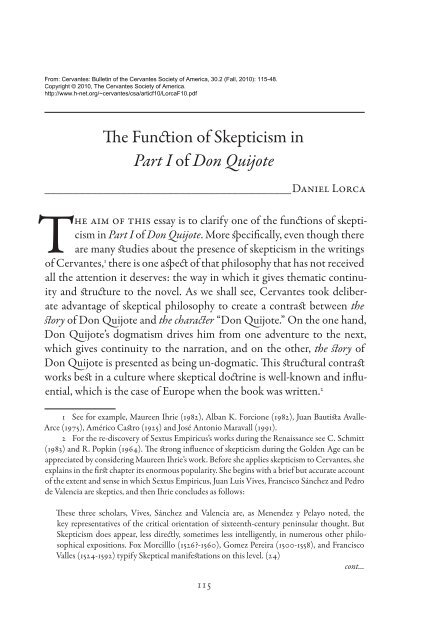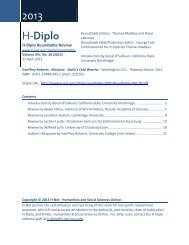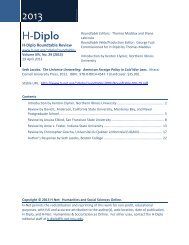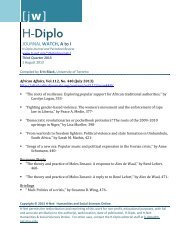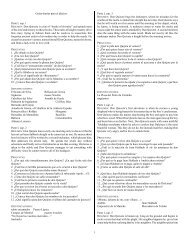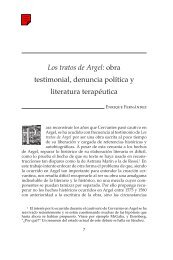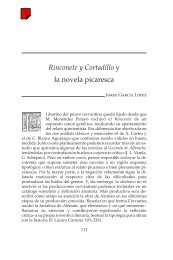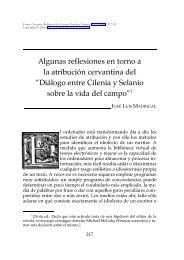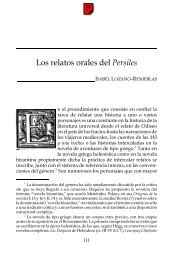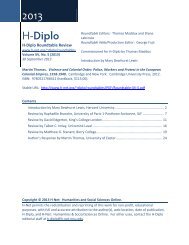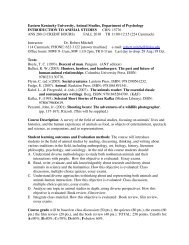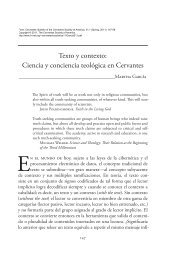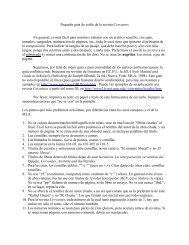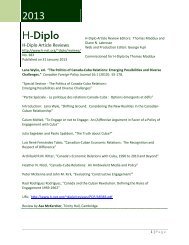The Function of Skepticism in Part I of Don Quijote - H-Net
The Function of Skepticism in Part I of Don Quijote - H-Net
The Function of Skepticism in Part I of Don Quijote - H-Net
Create successful ePaper yourself
Turn your PDF publications into a flip-book with our unique Google optimized e-Paper software.
<strong>The</strong> <strong>Function</strong> <strong>of</strong> <strong>Skepticism</strong> <strong>in</strong><br />
<strong>Part</strong> I <strong>of</strong> <strong>Don</strong> <strong>Quijote</strong><br />
__________________________________________Daniel Lorca<br />
<strong>The</strong> aim <strong>of</strong> this essay is to clarify one <strong>of</strong> the functions <strong>of</strong> skepticism<br />
<strong>in</strong> <strong>Part</strong> I <strong>of</strong> <strong>Don</strong> <strong>Quijote</strong>. More specifically, even though there<br />
are many studies about the presence <strong>of</strong> skepticism <strong>in</strong> the writ<strong>in</strong>gs<br />
<strong>of</strong> Cervantes, 1 there is one aspect <strong>of</strong> that philosophy that has not received<br />
all the attention it deserves: the way <strong>in</strong> which it gives thematic cont<strong>in</strong>uity<br />
and structure to the novel. As we shall see, Cervantes took deliberate<br />
advantage <strong>of</strong> skeptical philosophy to create a contrast between the<br />
story <strong>of</strong> <strong>Don</strong> <strong>Quijote</strong> and the character “<strong>Don</strong> <strong>Quijote</strong>.” On the one hand,<br />
<strong>Don</strong> <strong>Quijote</strong>’s dogmatism drives him from one adventure to the next,<br />
which gives cont<strong>in</strong>uity to the narration, and on the other, the story <strong>of</strong><br />
<strong>Don</strong> <strong>Quijote</strong> is presented as be<strong>in</strong>g un-dogmatic. This structural contrast<br />
works best <strong>in</strong> a culture where skeptical doctr<strong>in</strong>e is well-known and <strong>in</strong>fluential,<br />
which is the case <strong>of</strong> Europe when the book was written. 2<br />
1 See for example, Maureen Ihrie (1982), Alban K. Forcione (1982), Juan Bautista Avalle-<br />
Arce (1975), Américo Castro (1925) and José Antonio Maravall (1991).<br />
2 For the re-discovery <strong>of</strong> Sextus Empiricus’s works dur<strong>in</strong>g the Renaissance see C. Schmitt<br />
(1983) and R. Popk<strong>in</strong> (1964). <strong>The</strong> strong <strong>in</strong>fluence <strong>of</strong> skepticism dur<strong>in</strong>g the Golden Age can be<br />
appreciated by consider<strong>in</strong>g Maureen Ihrie’s work. Before she applies skepticism to Cervantes, she<br />
expla<strong>in</strong>s <strong>in</strong> the first chapter its enormous popularity. She beg<strong>in</strong>s with a brief but accurate account<br />
<strong>of</strong> the extent and sense <strong>in</strong> which Sextus Empiricus, Juan Luis Vives, Francisco Sánchez and Pedro<br />
de Valencia are skeptics, and then Ihrie concludes as follows:<br />
<strong>The</strong>se three scholars, Vives, Sánchez and Valencia are, as Menendez y Pelayo noted, the<br />
key representatives <strong>of</strong> the critical orientation <strong>of</strong> sixteenth-century pen<strong>in</strong>sular thought. But<br />
<strong>Skepticism</strong> does appear, less directly, sometimes less <strong>in</strong>telligently, <strong>in</strong> numerous other philosophical<br />
expositions. Fox Morcilllo (1526?-1560), Gomez Pereira (1500-1558), and Francisco<br />
Valles (1524-1592) typify Skeptical manifestations on this level. (24)<br />
cont...<br />
115
116 Daniel Lorca<br />
Cervantes<br />
<strong>Skepticism</strong> rejects authority as a valid mechanism to obta<strong>in</strong> truth.<br />
Argumentation and direct observation ought to be used <strong>in</strong>stead. <strong>The</strong> reason<br />
why authority is rejected <strong>in</strong> favor <strong>of</strong> argumentation and observation<br />
is because the former represents the most anti-skeptical attitude one can<br />
take: dogmatism (believ<strong>in</strong>g that someth<strong>in</strong>g is true only because an authority<br />
says that it is true). 3 If we keep this <strong>in</strong> m<strong>in</strong>d, then the structural<br />
After that conclusion Ihrie moves on to expla<strong>in</strong> the “extremely popular” views <strong>of</strong> Juan<br />
Huarte de San Juan, also a skeptic (25), and mentions briefly Erasmism, “the key <strong>in</strong>tellectualphilosophical<br />
current <strong>in</strong> sixteenth-century Spa<strong>in</strong>” (25). This current shares with the skeptic the<br />
“strong aversion to useless speculation” (26). F<strong>in</strong>ally, to give stronger support to her claim that<br />
skepticism played an important <strong>in</strong>fluential role <strong>in</strong> the literature <strong>of</strong> the time, Ihrie expla<strong>in</strong>s how<br />
it <strong>in</strong>fluenced the writ<strong>in</strong>gs <strong>of</strong> Quevedo (26). In short, accord<strong>in</strong>g to Ihrie, Cervantes’s skeptical<br />
tendencies are typical dur<strong>in</strong>g his time.<br />
3 In the current age the connection between skeptic methodology and ga<strong>in</strong><strong>in</strong>g empirical<br />
knowledge is almost unavoidable. For <strong>in</strong>stance, that connection is present <strong>in</strong> Popperian falsificationism,<br />
which is one <strong>of</strong> the most <strong>in</strong>fluential explanations for scientific discovery: Accord<strong>in</strong>g to<br />
falsificationism an acceptable conclusion <strong>in</strong> science is a conclusion that an experiment has failed<br />
to prove that it is false, and consequently the hypothesis can be accepted as true for the time be<strong>in</strong>g<br />
because it can no longer be reasonably doubted (Karl Popper, 1991, 106-111). Steven Hawk<strong>in</strong>g<br />
<strong>in</strong> <strong>The</strong> Illustrated a Brief History <strong>of</strong> Time uses falsificationism to justify his scientific endeavors:<br />
After mention<strong>in</strong>g Karl Popper, he writes: “Each time new experiments are observed to agree with<br />
predictions the theory survives, and our confidence <strong>in</strong> it <strong>in</strong>creases” (1996, 17). However, it is necessary<br />
to po<strong>in</strong>t out that historically, skepticism was conceived as a method to produce a happy life<br />
(that is, it was a moral theory). <strong>The</strong> skeptic’s position can be better appreciated if we read one <strong>of</strong><br />
the most famous skeptics <strong>of</strong> all time, Sextus Empiricus:<br />
<strong>The</strong> person who says that wealth, perhaps, is good and poverty bad, if he does not have wealth<br />
is disturbed <strong>in</strong> two ways, both because he does not have the good, and because he busies himself<br />
over the acquisition <strong>of</strong> it; but when he acquires it, he is punished <strong>in</strong> three ways, because he<br />
is elated beyond measure, because he busies himself with a view to the wealth’s rema<strong>in</strong><strong>in</strong>g with<br />
him, and because he agonizes and is afraid <strong>of</strong> its loss. But the person who ranks wealth neither<br />
among the th<strong>in</strong>gs by nature good nor among the th<strong>in</strong>gs by nature bad, but utters the expression<br />
‘not more,’ is neither disturbed <strong>in</strong> the absence <strong>of</strong> this nor elated at its presence, but <strong>in</strong><br />
either case rema<strong>in</strong>s undisturbed. So that as regards the th<strong>in</strong>gs thought by op<strong>in</strong>ion to be good<br />
and bad, and the choices and avoidances <strong>of</strong> these th<strong>in</strong>gs, he rema<strong>in</strong>s perfectly happy. (1997, 25)<br />
To obta<strong>in</strong> the happy life the skeptic argues aga<strong>in</strong>st all the other major positions <strong>of</strong> his time.<br />
For example, Sextus Empiricus beg<strong>in</strong>s by specify<strong>in</strong>g the targets <strong>of</strong> his arguments:<br />
All those philosophers who seem to proceed by methodical exposition <strong>of</strong> basic pr<strong>in</strong>ciples –<br />
and most conspicuously <strong>of</strong> all, those <strong>of</strong> the Old Academy and the Peripatetics, and also the<br />
Stoics— are accustomed to make a division, say<strong>in</strong>g that, <strong>of</strong> exist<strong>in</strong>g th<strong>in</strong>gs, some are good,<br />
some bad, and some <strong>in</strong> between, which they call <strong>in</strong>different. ( 3)<br />
cont...
Volume 30.2 (2010) <strong>The</strong> <strong>Function</strong> <strong>of</strong> <strong>Skepticism</strong><br />
117<br />
contrast between the skeptical story and <strong>Don</strong> <strong>Quijote</strong>‘s dogmatic character<br />
can be appreciated more easily.<br />
<strong>Skepticism</strong> and the Story <strong>of</strong> <strong>Don</strong> <strong>Quijote</strong><br />
<strong>The</strong> prologue conta<strong>in</strong>s an explanation <strong>of</strong> the problem fac<strong>in</strong>g the author:<br />
he is unsure what the “antiguo legislador que llaman vulgo” (13) will say<br />
about him and his book because <strong>of</strong> several reasons: the book has no erudition;<br />
it does not quote from Aristotle nor Plato; it does not appeal to<br />
Aqu<strong>in</strong>as nor the holy scripture; it does not have a list <strong>of</strong> authors that ends<br />
with Xen<strong>of</strong>onte, or Zolio or Zerxius (13); and it does not have at the beg<strong>in</strong>n<strong>in</strong>g<br />
poetry written by important people such as “duques, marqueses,<br />
condes, obispos, damas o poetas celebérrimos” (14). In short, the author<br />
is worried about the reception <strong>of</strong> the book by the “vulgo” because it lacks<br />
authority. <strong>The</strong>n we are told the solution. A friend who is unknown (and<br />
therefore lacks authority) proposes the follow<strong>in</strong>g: <strong>in</strong>vent the sonnets and<br />
claim that they were written by important people (for example, “Preste<br />
Juan” (15)); use the quotes that you already know and are easy to remember<br />
and place them strategically throughout the book, mak<strong>in</strong>g sure that<br />
they have authority (“Horacio”, “Escritura Div<strong>in</strong>a”, “Catόn” (15-16)); with<br />
respect to the annotations, <strong>in</strong>clude them us<strong>in</strong>g the same strategy, cit<strong>in</strong>g<br />
even more authorities such as “Ovidio . . . Homero . . . Virgilio . . . Julio<br />
César . . .Plutarco . . . Leόn Hebreo” (17); with respect to the list <strong>of</strong> authors,<br />
take it from another book and put it at the end <strong>of</strong> the book so that<br />
it gives “de improviso autoridad al libro” (18).<br />
In addition to the solution, the friend expla<strong>in</strong>s why the book needs<br />
no authority: “este vuestro libro no tiene necesidad de n<strong>in</strong>guna cosa de<br />
aquellas que vos decís que le falta, porque todo él es una <strong>in</strong>vectiva contra<br />
los libros de caballerías, de quien nunca se acordó Aristóteles, ni dijo<br />
nada San Basilio, ni alcanzό Cicerón” (18).<br />
Later on, to avoid long subjects, he will merely use the expression “dogmatism” to refer to<br />
all <strong>of</strong> them at once: “… and other th<strong>in</strong>gs, connected with the dogmatists’ pedantry, tend to be said<br />
aga<strong>in</strong>st such def<strong>in</strong>itions” (8).<br />
All the experts who have studied skepticism before the Enlightenment recognize the basic<br />
connection between that philosophy and the production <strong>of</strong> a happy life, such as for example,<br />
Peter Lom (2001), Marcelo de Araujo (2003) and John C. Laursen (1992).
118 Daniel Lorca<br />
Cervantes<br />
F<strong>in</strong>ally, the reason stat<strong>in</strong>g why the work was written conta<strong>in</strong>s an explicit<br />
reference aga<strong>in</strong>st authority: “esta vuestra escritura no mira a más<br />
que a deshacer la autoridad y cabida que en el mundo y en el vulgo tienen<br />
los libros de caballerías,…” (18). 4<br />
<strong>The</strong> constant underm<strong>in</strong><strong>in</strong>g <strong>of</strong> and preoccupation with authority cont<strong>in</strong>ues<br />
<strong>in</strong> Chapter N<strong>in</strong>e. In that chapter we learn that we do not know<br />
when the story <strong>of</strong> <strong>Don</strong> <strong>Quijote</strong> was written because it could be old or<br />
not. It could be ancient because most <strong>of</strong> it was miss<strong>in</strong>g, and this unfortunate<br />
event is expla<strong>in</strong>ed us<strong>in</strong>g time, who is “devorador y consumidor<br />
de todas las cosas” (100), but it could also be modern because a partial<br />
manuscript was found next to texts that were written recently, such as for<br />
example “Desengaño de cellos y N<strong>in</strong>fas y Pastores de Henares” (101). We do<br />
not know its provenance either, because the one sell<strong>in</strong>g it is a boy <strong>in</strong> the<br />
street. We do not speak the orig<strong>in</strong>al language <strong>of</strong> the found manuscript<br />
because it is <strong>in</strong> Arabic (101-2). 5 Furthermore, the person claim<strong>in</strong>g authorship<br />
is an Arabic historian named Cide Hamete Benengeli: “Historia de<br />
<strong>Don</strong> <strong>Quijote</strong> de la Mancha, escrita por Cide Hamete Benengeli, historiador<br />
4 Carmen Escudero’s view <strong>in</strong>dicates <strong>in</strong>directly that Cervantes’s technique <strong>of</strong> not follow<strong>in</strong>g<br />
the friend’s recommendations but merely report<strong>in</strong>g them, produces a skeptical attitude on<br />
the reader: “En lugar de <strong>of</strong>recer un resultado, un prólogo perfecto (en el sentido de ya concluso),<br />
Cervantes <strong>of</strong>rece el proceso mismo de la confección de ese prólogo, e <strong>in</strong>tenta hacer al lector confidente<br />
de sus dudas, con lo que el dest<strong>in</strong>atario quedará def<strong>in</strong>itivamente implicado en la obra al<br />
sentirse <strong>in</strong>cluso colaborador de ella” (184). Fajardo’s view also po<strong>in</strong>ts to skepticism: “<strong>The</strong> first<br />
author does not say that he undertook to follow his friend’s advice but that his friend’s words<br />
left an impr<strong>in</strong>t <strong>in</strong> him… Thus, he adopts his friend’s statement as worthy <strong>of</strong> imitation because it<br />
has been voided <strong>of</strong> authoritative context” (11).One <strong>of</strong> the basis <strong>of</strong> skepticism is to embrace doubt<br />
(Escudero) and reject authority (Fajardo) as a method <strong>of</strong> discovery, and therefore their conclusions<br />
are consistent with skepticism. For example, Francisco Sánchez was a well known skeptic<br />
dur<strong>in</strong>g the period, and he writes <strong>in</strong> the prologue to Que nada se sabe: “Tú, lector desconocido,<br />
quienquiera que seas, con tal que tuvieres la misma condición y temperamento que yo; tú, que<br />
dudaste muchas veces, en lo secreto de tu alma, sobre la naturaleza de las cosas, ven ahora a dudar<br />
conmigo; ejercitemos juntos nuestros <strong>in</strong>genios y facultades; séanos a los dos libre el juicio, pero<br />
no irracional” (1923, xvii). He also writes: “Tampoco me pidas autoridades ni falsos acatamientos<br />
a la op<strong>in</strong>ión ajena” (xx).<br />
5 Caroll Johnson has shown that “<strong>of</strong> the eighteen Castilian romances <strong>of</strong> chivalry published<br />
between 1508 and 1589, thirteen purport to have been written orig<strong>in</strong>ally <strong>in</strong> Greek, and one each <strong>in</strong><br />
Lat<strong>in</strong>, English, an unspecified foreign language, and Arabic” (2007, 180). <strong>The</strong>refore, the story <strong>of</strong><br />
don <strong>Quijote</strong> is consistent with this aspect <strong>of</strong> the tradition; however, Caroll Johnson’s f<strong>in</strong>d<strong>in</strong>g does<br />
not change the notion that the readers <strong>of</strong> the story <strong>of</strong> <strong>Don</strong> <strong>Quijote</strong> do not understand Arabic. We<br />
do not read the “orig<strong>in</strong>al” (Arabic), but a “translation” (Castillian).
Volume 30.2 (2010) <strong>The</strong> <strong>Function</strong> <strong>of</strong> <strong>Skepticism</strong><br />
119<br />
arábigo”(102), and the authority <strong>of</strong> this historian is underm<strong>in</strong>ed because<br />
the text specifies that all Arabs are liars: “su autor [es] arábigo, siendo<br />
muy propio de los de aquella nación ser mentirosos” (103). 6 F<strong>in</strong>ally, we do<br />
not know who translated it from Arabic to Castilian because the translator<br />
is another unknown Arab (another liar, accord<strong>in</strong>g to the text): “La<br />
suerte me deparό [un Morisco aljamiado]” (102) and “roguéle me volviese<br />
aquellos cartapacios . . . en lengua castellana;” therefore, when the text<br />
says that “la traducciόn, comenzaba desta manera” (104), we have been<br />
led to believe that we are read<strong>in</strong>g a text written by an Arab historian, and<br />
we are told that Arabs are liars. This unreliable text is then translated by a<br />
Morisco, and we don’t know if it is truly a faithful translation. We are also<br />
led to believe that we do not know its provenance, because the one sell<strong>in</strong>g<br />
it is a boy <strong>in</strong> the street. F<strong>in</strong>ally, we don’t know if the text is ancient or<br />
modern, but later we learn it must be modern given the dates <strong>in</strong> the text.<br />
In short, we are led to believe that the text has no authority whatsoever.<br />
<strong>The</strong> rejection <strong>of</strong> authority is therefore present <strong>in</strong> four key elements<br />
<strong>of</strong> the text: (1) it is associated with the explicit justification <strong>of</strong> the text<br />
(i.e., to underm<strong>in</strong>e the authority <strong>of</strong> the Romances <strong>of</strong> Chivalry); (2) it is<br />
used to construct the greater part <strong>of</strong> the prologue by way <strong>of</strong> mock<strong>in</strong>g the<br />
authorities; (3) the text says <strong>of</strong> itself that it does not need any authority;<br />
(4) and f<strong>in</strong>ally, given the <strong>in</strong>formation <strong>in</strong> Chapter N<strong>in</strong>e, the text does not<br />
have authority. To sum up, Cervantes took such great care <strong>in</strong> mak<strong>in</strong>g sure<br />
that the story <strong>of</strong> <strong>Don</strong> <strong>Quijote</strong> does not depend on authority, that even his<br />
attack aga<strong>in</strong>st the authority <strong>of</strong> the Romances <strong>of</strong> Chivalry comes from a<br />
text that does not have authority (or so we are led to believe).<br />
This attitude is consistent with skeptical doctr<strong>in</strong>e. We need to recall<br />
that Sextus Empiricus argued aga<strong>in</strong>st the authorities <strong>of</strong> his time call<strong>in</strong>g<br />
them “dogmatics”, and that his works were rediscovered and <strong>in</strong>fluential<br />
dur<strong>in</strong>g the Renaissance. For Sextus Empiricus, truth is obta<strong>in</strong>ed by way<br />
<strong>of</strong> argument and direct observation, and not because the one who said<br />
6 <strong>The</strong> authority <strong>of</strong> Cide Hamete is underm<strong>in</strong>ed by two additional factors which may not<br />
be as immediately obvious as the one mentioned <strong>in</strong> the ma<strong>in</strong> body <strong>of</strong> the text: no one knows what<br />
else he has written, and as mentioned by Martín the Riquer <strong>in</strong> his edition <strong>of</strong> <strong>Don</strong> <strong>Quijote</strong> (2002),<br />
the name is <strong>in</strong>vented, common and ironic: “Nombre <strong>in</strong>ventado, pero en auténtico árabe e irónico:<br />
cide, señor, Hamete, el nombre árabe Hamid, y Benengeli, aberenjenado. Hamete era un nombre<br />
muy corriente entre moriscos” (102, n.11).
120 Daniel Lorca<br />
Cervantes<br />
it has authority. For example, his <strong>in</strong>fluence can be found <strong>in</strong> the work <strong>of</strong><br />
Francisco Sánchez, a skeptic <strong>of</strong> the period who also rejects authority <strong>in</strong><br />
favor <strong>of</strong> argumentation and observation:<br />
Tampoco me pidas autoridades ni falsos acatamientos a la op<strong>in</strong>ión<br />
ajena, porque ello más bien sería <strong>in</strong>dicio de ánimo servil e <strong>in</strong>docto<br />
que de un espíritu libre y amante de la verdad. Yo sólo seguiré con la<br />
razón a sola la naturaleza [that is, observation]. La autoridad manda<br />
creer; la razón demuestra las cosas; aquélla es apta para la fe; ésta para<br />
la ciencia. (1923, xx)<br />
This basic skeptical attitude is ma<strong>in</strong>ta<strong>in</strong>ed <strong>in</strong> <strong>Part</strong> I: the truth about<br />
<strong>Don</strong> <strong>Quijote</strong>, and by association the truth about the Romances <strong>of</strong><br />
Chivalry, will depend on the story <strong>of</strong> <strong>Don</strong> <strong>Quijote</strong>, and not on the authority<br />
<strong>of</strong> anyone.<br />
Many critics have po<strong>in</strong>ted out that the text is highly unstable <strong>in</strong> terms<br />
<strong>of</strong> its truth-value. For example, Howard Manc<strong>in</strong>g’s analysis demonstrates<br />
the complexities that arise: 7<br />
When he first discovers the manuscript he laments that the author is<br />
Arabic “siendo muy propio de los de aquella nacion ser mentirosos” (I,<br />
9, 102). <strong>The</strong>n, after not<strong>in</strong>g that historians should be “puntuales, verdaderos<br />
y no nada apasionados” –essentially the qualities praised <strong>in</strong><br />
Cide Hamete— he eschews responsibility for any error <strong>in</strong> the story:<br />
“y si algo bueno en ella faltare, para mí tengo que fue por culpa del<br />
galgo de su autor (p. 103).” (1981, 66)<br />
It should be noted that this strong destabilization is consistent with<br />
the skeptical tradition: accord<strong>in</strong>g to skepticism what ought to be done<br />
is to suspend judgment, 8 And that is precisely what the destabiliz<strong>in</strong>g ele-<br />
7 See also, for example, Thomas A. Lathrop, “Cide Hamete Benengeli y su manuscrito,”<br />
Cervantes, su obra y su mundo. Madrid: Edi-6, 1981: 693-98, and James A. Parr, <strong>Don</strong> Quixote: an<br />
Anatomy <strong>of</strong> Subversive Discourse. Newark: Juan de la Cuesta, 1988.<br />
8 Maureen Ihrie expla<strong>in</strong>s: “the skeptic feels the only reasonable solution to the dilemma<br />
[about the truth or falsehood <strong>of</strong> claims] is to suspend judgment on all matters and live undog-
Volume 30.2 (2010) <strong>The</strong> <strong>Function</strong> <strong>of</strong> <strong>Skepticism</strong><br />
121<br />
ments <strong>in</strong> the story accomplish: given that it is difficult if not impossible<br />
to ascerta<strong>in</strong> the truth or the falsehood <strong>of</strong> the story based on authority, the<br />
reader is forced to reject authority as a valid pr<strong>in</strong>ciple <strong>of</strong> argumentation.<br />
This entails <strong>in</strong> turn that the only th<strong>in</strong>g left is the story itself. Regardless <strong>of</strong><br />
whether the story has authority or not, we have no alternative but to read<br />
about <strong>Don</strong> <strong>Quijote</strong>. This is important from the perspective <strong>of</strong> skepticism<br />
because if we simply read the story, then we will observe <strong>Don</strong> <strong>Quijote</strong> as<br />
the story unfolds. In other words, no appeal to authority is needed because<br />
the only th<strong>in</strong>g the reader has to do is to read the story.<br />
It should be noted that <strong>in</strong> this analysis the relationship between <strong>Part</strong><br />
I and authority has been discussed from a very limited perspective: the<br />
perspective <strong>of</strong> skepticism as a method to establish truth. If, however, we<br />
expand the use <strong>of</strong> authority to <strong>in</strong>clude other uses, then the relationship<br />
becomes more complex.<br />
Literary critics tend to view the question <strong>of</strong> authority from the perspective<br />
<strong>of</strong> mimesis and literary models. For example, Frederick de Armas<br />
associates the giant Goliath, who is mentioned <strong>in</strong> the prologue, with several<br />
traditions, or models:<br />
Although Eduardo Urb<strong>in</strong>a (1987) and Agustín Redondo (1998)<br />
rightly search for models <strong>of</strong> Cervant<strong>in</strong>e imitation <strong>in</strong> the chivalric romances,<br />
the prologue <strong>of</strong> <strong>Don</strong> Quixote makes it clear that there are<br />
other traditions <strong>of</strong> giants, the biblical and the classical. (2006, 43) 9<br />
Carolyn A. Nadeau explores the women mentioned <strong>in</strong> the prologue<br />
<strong>in</strong> order to illum<strong>in</strong>ate the k<strong>in</strong>d <strong>of</strong> imitation used most frequently by<br />
matically, <strong>in</strong> accord with the customs and laws one perceives but without mak<strong>in</strong>g any judgment<br />
as to their absolute truth or falsehood” (1982, 14).<br />
9 Frederick de Armas also writes the follow<strong>in</strong>g: “An <strong>in</strong>nkeeper is compared to Cacus <strong>in</strong> the<br />
second chapter <strong>of</strong> <strong>Part</strong> I, while the size <strong>of</strong> Goliath is discussed <strong>in</strong> the first chapter <strong>of</strong> <strong>Part</strong> II us<strong>in</strong>g<br />
the bible as authority.” (2006, 43). <strong>The</strong> giant Cacus is not be<strong>in</strong>g used as a means towards establish<strong>in</strong>g<br />
the truth <strong>of</strong> the story, but as a comparison. On the other hand, even though the existence<br />
<strong>of</strong> Goliath is supported with an appeal to authority, that use is <strong>in</strong> <strong>Part</strong> II, and therefore it falls<br />
outside <strong>of</strong> the parameters <strong>of</strong> this study. I suspect strongly that the relationship between authority<br />
and skepticism changes <strong>in</strong> <strong>Part</strong> II, but that change cannot be covered here.
122 Daniel Lorca<br />
Cervantes<br />
Cervantes. 10 As a f<strong>in</strong>al example, Michael McGaha argues that the imitation<br />
<strong>of</strong> models found <strong>in</strong> <strong>Don</strong> <strong>Quijote</strong> can be <strong>in</strong>terpreted as an attempt to<br />
surpass Virgil: “Cervantes’ primary <strong>in</strong>tention <strong>in</strong> <strong>Don</strong> Quixote . . . was to<br />
imitate and improve upon Virgil’s Aeneid” (1980, 34).<br />
This general emphasis on authority as it relates to imitation is well<br />
justified because it is consistent with one <strong>of</strong> the ways <strong>in</strong> which authority<br />
was viewed dur<strong>in</strong>g the Renaissance and the Golden Age. For example,<br />
Ángel García Galiano writes:<br />
La admiración por los clásicos es a la vez una necesidad de elevar la<br />
Antigua poética romance a las más altas cotas de genialidad estética.<br />
La imitación, por lo tanto, se convierte, aparte de una doctr<strong>in</strong>a preceptiva<br />
y estética, en una técnica sistematizada y rigurosa. (1992, 449)<br />
García Galiano also po<strong>in</strong>ts out that the attitude towards the classics<br />
is not only imitative because it is <strong>of</strong>ten jo<strong>in</strong>ed with an attempt to obta<strong>in</strong><br />
<strong>in</strong>novation, or <strong>in</strong>vention. <strong>The</strong> goal is not merely to copy what the classics<br />
did, but to improve their works. García Galiano quotes Vilanova as follows<br />
to expla<strong>in</strong> this important aspect:<br />
La doctr<strong>in</strong>a de la imitación renacentista no se limita en modo alguno<br />
a un remedo ideal de los modelos clásicos, s<strong>in</strong>o que consiste en una<br />
reelaboración consciente de temas e ideas de la antigüedad grecolat<strong>in</strong>a,<br />
cuando no en una sistemática apropiación de las fόrmulas estilísticas<br />
y de los recursos retóricos de los poetas clásicos y modernos, muchas<br />
veces convertidos en tópicos por la tradición renacentista. (449)<br />
Furthermore, this attitude towards authority can be traced back to<br />
earlier times. Jacquel<strong>in</strong>e T. Miller beg<strong>in</strong>s by quot<strong>in</strong>g a remark made by<br />
Bernard <strong>of</strong> Chartres, “the twelfth-century humanist and educator” (1986,<br />
10 For example, after compar<strong>in</strong>g the ways <strong>in</strong> which Guevara, Ovid and Virgil make use <strong>of</strong><br />
authority when it comes to imitation, Carolyn A. Nadeau concludes that “although Cervantes’s<br />
imitation differs greatly from Guevara’s imitations <strong>of</strong> sources, Cervantes does share similarities<br />
with Ovid and Virgil, because at times he, like Ovid, subtly <strong>in</strong>corporates his models <strong>in</strong>to narrative<br />
and, like Virgil, at times dismisses them” (2002, 133).
Volume 30.2 (2010) <strong>The</strong> <strong>Function</strong> <strong>of</strong> <strong>Skepticism</strong><br />
123<br />
9): “we are as dwarfs perched upon the shoulders <strong>of</strong> giants” (9), and then<br />
she expla<strong>in</strong>s:<br />
This is neither a wholesale advocacy <strong>of</strong> reverence for the ancient<br />
author nor a wholesale dismissal <strong>of</strong> the contemporary author. It attempts<br />
to acknowledge the value <strong>of</strong> the ancients and the reliance <strong>of</strong><br />
the moderns upon them, and simultaneously to recognize the value<br />
<strong>of</strong> the moderns and the contributions their greater vision may make.<br />
<strong>The</strong> remark grants the importance <strong>of</strong> study<strong>in</strong>g the ancients, but not<br />
at the cost <strong>of</strong> ignor<strong>in</strong>g the achievements possible by the moderns. (11)<br />
<strong>The</strong>refore, when we consider what the critics have said as exemplified<br />
by Frederick de Armas, Carolyn A. Nadeau and Michael McGaha, and<br />
when we add to their views the general attitude towards imitation as expla<strong>in</strong>ed<br />
by García Galiano and Jackel<strong>in</strong>e T. Miller, it becomes clear that<br />
Cervantes did not reject authority <strong>in</strong> <strong>Part</strong> I when it comes to imitation/<br />
improvement. 11<br />
However, the theory <strong>of</strong> imitation is not the only concern with authority<br />
dur<strong>in</strong>g the Golden Age and the Renaissance: equally important<br />
is the role <strong>of</strong> authority <strong>in</strong> arguments that purport to establish truth. 12 For<br />
example, the rejection <strong>of</strong> authority is at the heart <strong>of</strong> the newly discovered<br />
and very <strong>in</strong>fluential skeptical texts <strong>of</strong> Sextus Empiricus. It is also a constant<br />
theme <strong>in</strong> all the writers <strong>of</strong> the Renaissance and the Golden Age that<br />
exhibit skeptical tendencies, such as for example Montaigne, Erasmus,<br />
Vives and Francisco Sánchez. 13 <strong>The</strong> rejection <strong>of</strong> authority <strong>in</strong> favor <strong>of</strong> di-<br />
11 As further support, <strong>Part</strong> I <strong>of</strong>fers explicitly a theory <strong>of</strong> the value <strong>of</strong> literature that depends<br />
at least <strong>in</strong> part on imitat<strong>in</strong>g authority. <strong>The</strong> discussion between the priest and the canónigo po<strong>in</strong>ts<br />
to the notion that art is worthy when it is imitative to some extent and <strong>in</strong> some way: “son más<br />
dignos de reprehensión los que hasta aquí han compuesto semejantes libros s<strong>in</strong> tener advertencia<br />
a n<strong>in</strong>gún buen discurso, ni al arte y reglas por donde pudieran guiarse y hacerse famosos, como lo<br />
son en verso y prosa los dos príncipes de la poesía griega y lat<strong>in</strong>a” (48, 505).<br />
12 For the sake <strong>of</strong> accuracy it should be noted that the explanation <strong>in</strong> the ma<strong>in</strong> body does<br />
not entail that the critics ignore the relation between truth and authority. My claim is weaker:<br />
the general emphasis and ma<strong>in</strong> concern tends to be the relation between imitation/improvement<br />
and authority.<br />
13 For more <strong>in</strong>formation about the skeptical tendencies <strong>of</strong> the mentioned authors, see for<br />
example Maureen Ihrie (1982, 11-18).
124 Daniel Lorca<br />
Cervantes<br />
rect observation is one <strong>of</strong> the forces driv<strong>in</strong>g the establishment <strong>of</strong> the empirical<br />
sciences. <strong>The</strong> preoccupation with the role <strong>of</strong> authority <strong>in</strong> matters<br />
<strong>of</strong> truth comes to the forefront <strong>in</strong> the conference <strong>of</strong> Valladolid, when the<br />
orthodoxy (i.e., truth) <strong>of</strong> Erasmus’s writ<strong>in</strong>gs was scrut<strong>in</strong>ized:<br />
Los frailes pasaban en revista los pr<strong>in</strong>cipales puntos de dogma y discipl<strong>in</strong>a:<br />
la Tr<strong>in</strong>idad, la div<strong>in</strong>idad de Cristo, la div<strong>in</strong>idad del Espíritu<br />
Santo, la <strong>in</strong>quisición de la herejía, los sacramentos . . ., la autoridad de<br />
la Escritura, la teología dogmática, la autoridad de los Santos Padres,<br />
el culto de la Virgen, la autoridad de los Papas y concilios, las ceremonias,<br />
los ayunos y abst<strong>in</strong>encias, el celibato, la escolástica, las <strong>in</strong>dulgencias,<br />
el culto de los santos . . ., el derecho de propiedad de los<br />
bienes temporales, el libre albedrío, las penas del <strong>in</strong>fierno, y bajo cada<br />
uno de esos capítulos [los frailes] representaban textos sospechosos<br />
entresacados de la obra de Erasmo. (1939, 289)<br />
Out <strong>of</strong> the twenty themes discussed, six are directly related to authority.<br />
14 This shows that imitation is not the only way <strong>in</strong> which authority was<br />
important dur<strong>in</strong>g Cervantes’s time: equally important is the role we ascribe<br />
to authority <strong>in</strong> matters <strong>of</strong> belief, truth, and persuasion. 15 <strong>The</strong>refore,<br />
<strong>in</strong> the same way that the text makes clear that Cervantes accepted author-<br />
14 In matters <strong>of</strong> religious doctr<strong>in</strong>e a further dist<strong>in</strong>ction can be made between “textual<br />
authority” and “theological auctoritas.” However, <strong>in</strong> the context <strong>of</strong> this <strong>in</strong>vestigation that dist<strong>in</strong>ction<br />
is unnecessary. <strong>The</strong> goal is to show that there was a concern with authority <strong>in</strong> matters<br />
<strong>of</strong> argumentation and truth, and the quoted passage exemplifies that concern without further<br />
dist<strong>in</strong>ctions.<br />
15 <strong>The</strong> importance <strong>of</strong> authority dur<strong>in</strong>g the period can be appreciated <strong>in</strong> the works <strong>of</strong> Peter<br />
Ramus (1515-1572). He was a teacher <strong>of</strong> Rhetoric <strong>in</strong> the University <strong>of</strong> Paris, the most important<br />
center <strong>of</strong> scholasticism, and consequently, the place where authority was revered the most. He<br />
dedicated his life to attack relentlessly scholastic methodology: “[Ramus’s] books had the effrontery<br />
not only to condemn the argumentative methods <strong>in</strong> use <strong>in</strong> the University <strong>of</strong> Paris s<strong>in</strong>ce at<br />
least the twelfth century but also to argue for replac<strong>in</strong>g them with Ramus’s way” (Patricia Bizzell<br />
and Bruce Herzberg, editors, 1990, 557). Today he is considered one <strong>of</strong> the most important figures<br />
<strong>in</strong> the history <strong>of</strong> modern Rhetoric.<br />
Ramus chose three ma<strong>in</strong> targets: Aristotle, Cicero and Qu<strong>in</strong>tilian. He chose them because<br />
all three authors had enormous <strong>in</strong>fluence <strong>in</strong> the teach<strong>in</strong>g <strong>of</strong> Rhetoric throughout Europe (they<br />
had authority). In Argument <strong>in</strong> Rhetoric aga<strong>in</strong>st Qu<strong>in</strong>tilian he beg<strong>in</strong>s with this statement after a<br />
polite <strong>in</strong>troduction: “I have a s<strong>in</strong>gle argument, a s<strong>in</strong>gle subject matter, that the arts <strong>of</strong> dialectic<br />
and rhetoric have been confused by Aristotle, Cicero and Qu<strong>in</strong>tilian. I have previously argued
Volume 30.2 (2010) <strong>The</strong> <strong>Function</strong> <strong>of</strong> <strong>Skepticism</strong><br />
125<br />
ity when it comes to imitation (and improvement), the same text also<br />
makes clear that the truth <strong>of</strong> the story <strong>of</strong> don <strong>Quijote</strong> is presented as not<br />
depend<strong>in</strong>g on any authority. I f<strong>in</strong>d that one <strong>of</strong> the greatest achievements<br />
<strong>of</strong> the book is precisely this complex relation: on the one hand authority<br />
is rejected as a valid pr<strong>in</strong>ciple <strong>of</strong> argumentation, but on the other it is not<br />
rejected when it comes to literary models.<br />
A question becomes unavoidable: <strong>Part</strong> I is literature, not philosophy,<br />
and therefore, why would a book that is non-philosophical be so concerned<br />
with authority <strong>in</strong> matters <strong>of</strong> argumentation?<br />
<strong>The</strong> first explanation that comes to m<strong>in</strong>d is by itself <strong>in</strong>sufficient: a<br />
topos <strong>of</strong> the times is that a book should teach while produc<strong>in</strong>g delight<br />
(deleitar enseñando); therefore, if a book should teach, then it seems that<br />
a preoccupation with authority is <strong>in</strong> order because the teach<strong>in</strong>g method<br />
may depend on authority, or it may not. Furthermore, this topos is found<br />
aga<strong>in</strong>st Aristotle and Cicero” (563). <strong>The</strong>n he argues relentlessly aga<strong>in</strong>st Qu<strong>in</strong>tilian. He first expla<strong>in</strong>s<br />
Qu<strong>in</strong>tilian’s position by quot<strong>in</strong>g him:<br />
I teach [Qu<strong>in</strong>tilian] says, ‘that the orator cannot be perfect unless he is a good man.<br />
Consequently I demand from him not only outstand<strong>in</strong>g skill <strong>in</strong> speak<strong>in</strong>g but all the virtuous<br />
qualities <strong>of</strong> character.’ This is the type <strong>of</strong> orator that Qu<strong>in</strong>tilian constructs for us. Afterwards<br />
<strong>in</strong> the twelfth book where he def<strong>in</strong>es him <strong>in</strong> similar terms as a good man skilled <strong>in</strong> speak<strong>in</strong>g<br />
well, he identifies those virtuous qualities <strong>of</strong> character as justice, courage, self-control, prudence,<br />
likewise knowledge <strong>of</strong> the whole <strong>of</strong> philosophy and <strong>of</strong> law, a thorough acqua<strong>in</strong>tance<br />
with history, and many other attributes worthy <strong>of</strong> praise. (565)<br />
It is clear from the quoted passage that accord<strong>in</strong>g to Qu<strong>in</strong>tilian the orator has authority<br />
because he must be perfect . This is confirmed when we consider the way <strong>in</strong> which Ramus quotes<br />
Qu<strong>in</strong>tilian: “ ‘An evil man cannot have leisure to devote to rhetoric’ he says. Or aga<strong>in</strong>, ‘<strong>The</strong> greatest<br />
part <strong>of</strong> rhetoric concerns goodness and justice’” (568), and “Virtue’s authority prevails <strong>in</strong> persuasion”<br />
(568).<br />
Ramus’s attack aga<strong>in</strong>st Qu<strong>in</strong>tilian expla<strong>in</strong>s <strong>in</strong>directly why authority had such an enormous<br />
appeal. If, to beg<strong>in</strong> with, only those that are perfect speak well accord<strong>in</strong>g to Qu<strong>in</strong>tilian, then<br />
they have total authority because they are perfect <strong>in</strong> everyway. It should be noted that despite <strong>of</strong><br />
Ramus’s best efforts, the connection between perfection and authority was still strong up to the<br />
Enlightenment. It should be noted as well that Ramus’s arguments exhibit a strong skeptical component.<br />
His skepticism comes to the forefront when he asks a rhetorical question about Cicero:<br />
“<strong>The</strong>re is yet another po<strong>in</strong>t <strong>in</strong> respect to the authority <strong>of</strong> Cicero: Do we wish the authority <strong>of</strong> any<br />
man <strong>in</strong> a debate concern<strong>in</strong>g an art to be superior to the truth <strong>of</strong> the case” (574)? Obviously, for<br />
Ramus the answer is no: an authority is right when he or she believes the truth, but the authority<br />
cannot be right simply because he or she is the authority.
126 Daniel Lorca<br />
Cervantes<br />
when the Canόnigo expla<strong>in</strong>s to the Priest why he has never been able to<br />
f<strong>in</strong>ish read<strong>in</strong>g any Romance <strong>of</strong> Chivalry:<br />
Este género de escritura y composición cae debajo de aquél de las<br />
fábulas que llaman milesias, que son cuentos disparatados, que atienden<br />
solamente a deleitar, y no a enseñar: al contrario de lo que hacen<br />
las fábulas apόlogas, que deleitan y enseñan juntamente. (47, 501-2)<br />
However, the notion that a book should teach and produce delight is<br />
not sufficient to answer the question at hand because many other books<br />
<strong>of</strong> the period make the same claim, and most <strong>of</strong> them do not conta<strong>in</strong> a<br />
strong rejection <strong>of</strong> authority <strong>in</strong> matters <strong>of</strong> argumentation.<br />
A better answer is to say that the book is not only literature, but also a<br />
serious attempt to establish truth; <strong>in</strong> other words, the book is also philosophical<br />
<strong>in</strong> the sense that it has taken upon itself a task that is normally<br />
associated with philosophy: the illum<strong>in</strong>ation <strong>of</strong> truth and the banishment<br />
<strong>of</strong> falsehood. <strong>The</strong> story <strong>of</strong> <strong>Don</strong> <strong>Quijote</strong> is similar to philosophy <strong>in</strong><br />
the sense that it presents the reader with a series <strong>of</strong> reasons to establish the<br />
truth that the Romances <strong>of</strong> Chivalry have no authority.<br />
If the book is read tak<strong>in</strong>g <strong>in</strong>to account its similarities with philosophy<br />
(without for that reason negat<strong>in</strong>g its literary character), then the<br />
question <strong>of</strong> authority as it relates to argumentation becomes unavoidable:<br />
after all, the aim <strong>of</strong> the book under this philosophical perspective<br />
is to conv<strong>in</strong>ce the reader that Chivalric Romances have no authority, and<br />
therefore a stance towards authority as a valid form <strong>of</strong> argumentation<br />
becomes necessary. <strong>The</strong> text reveals the author’s choice: it is rejected <strong>in</strong><br />
matters <strong>of</strong> persuasion and truth, or, us<strong>in</strong>g other words, the text depends<br />
on skeptical methodology (argumentation and direct observation).<br />
<strong>The</strong> complex relation with authority found <strong>in</strong> the text can therefore<br />
be expla<strong>in</strong>ed if we ma<strong>in</strong>ta<strong>in</strong> that the book is, at the same time, a serious<br />
attempt to do the best k<strong>in</strong>d <strong>of</strong> literature accord<strong>in</strong>g to the standards <strong>of</strong> the<br />
time (imitation and <strong>in</strong>vention), an also a serious attempt to obta<strong>in</strong> a result<br />
that is normally reserved for philosophy (it is true that the Romances<br />
<strong>of</strong> Chivalry have no authority). Furthermore, <strong>in</strong> order to avoid oversimplify<strong>in</strong>g<br />
the issue, it should be acknowledged that the two attitudes to-
Volume 30.2 (2010) <strong>The</strong> <strong>Function</strong> <strong>of</strong> <strong>Skepticism</strong><br />
127<br />
wards authority conta<strong>in</strong>ed <strong>in</strong> the text <strong>in</strong>fluence each other, mak<strong>in</strong>g a web<br />
<strong>of</strong> relations that adds more complexity. However, those complexities<br />
must be put aside because <strong>in</strong> this <strong>in</strong>vestigation the skeptical aspects <strong>of</strong><br />
the book take precedence. This emphasis should not be taken to imply<br />
the absurdity that the literary aspects <strong>of</strong> the text are less important.<br />
To sum up, even though my analysis depends on a very limited perspective,<br />
the follow<strong>in</strong>g conclusion applies with<strong>in</strong> the parameters <strong>of</strong> the<br />
<strong>in</strong>vestigation: <strong>The</strong> strategy used by Cervantes to construct the story <strong>of</strong><br />
don <strong>Quijote</strong> is consistent with the skeptical tradition <strong>in</strong> three important<br />
ways: first, there is a deliberate effort to present the story as be<strong>in</strong>g<br />
as non-dogmatic as possible; second, the destabilization thus created is<br />
consistent with skeptical doctr<strong>in</strong>e because it forces the reader to suspend<br />
judgment about the authority <strong>of</strong> the story; third, given that the reader<br />
cannot make positive judgments <strong>of</strong> that k<strong>in</strong>d, he or she has no choice but<br />
to observe <strong>Don</strong> <strong>Quijote</strong>.<br />
Some critics, such as for example E. T. Aylward (1999) and Ruth El<br />
Saffar (1974), have expla<strong>in</strong>ed the ma<strong>in</strong> differences between the genres <strong>of</strong><br />
the Romance and the Novel. Aylward concludes that the novel “is the<br />
preferred fictional form <strong>of</strong> skeptics and doubters” (1999, 17). My analysis<br />
shows that Cervantes took the skeptical tendencies <strong>of</strong> the novel a<br />
step further: the story <strong>of</strong> <strong>Don</strong> <strong>Quijote</strong> is constructed <strong>in</strong> part by tak<strong>in</strong>g<br />
deliberate advantage <strong>of</strong> some important skeptical themes <strong>in</strong> matters <strong>of</strong><br />
argumentation.<br />
<strong>Skepticism</strong> and the Standard Objection<br />
aga<strong>in</strong>st the Romances <strong>of</strong> Chivalry<br />
If we emphasize the argumentative aspects <strong>of</strong> the text (without for that<br />
reason negat<strong>in</strong>g that the book is literature), then the function <strong>of</strong> skepticism<br />
<strong>in</strong> the story <strong>of</strong> <strong>Don</strong> <strong>Quijote</strong> can be better appreciated if we take <strong>in</strong>to<br />
account the standard objection aga<strong>in</strong>st the Romances <strong>of</strong> Chivalry. <strong>The</strong><br />
most common objection dur<strong>in</strong>g the Renaissance and the Golden Age<br />
is not only that they conta<strong>in</strong> all k<strong>in</strong>ds <strong>of</strong> falsehoods, but also that those<br />
falsehoods are harmful to one’s character. More precisely, the objection<br />
does not state that those books are false and harmful, but that they are<br />
harmful because they are false. One does not have to go far to see this
128 Daniel Lorca<br />
Cervantes<br />
strong connection between falsehood and harm. For example, <strong>in</strong> his <strong>in</strong>troduction<br />
to <strong>Don</strong> <strong>Quijote</strong>, Martín de Riquer <strong>of</strong>fers a long list <strong>of</strong> “autores<br />
graves” that argue aga<strong>in</strong>st the Romances <strong>of</strong> Chivalry because their falsehoods<br />
produce harm (2002, xxxvi – xxxviii). <strong>The</strong> list beg<strong>in</strong>s <strong>in</strong> the year<br />
1522 with Juan de Mol<strong>in</strong>a, and ends with Fray Luis de la Cerda <strong>in</strong> 1599.<br />
Fray Agustín Salucio holds <strong>in</strong> the year 1559 the follow<strong>in</strong>g view:<br />
. . . . n<strong>in</strong>gún español que haya tenido <strong>in</strong>genio lo ha tenido en tan poco<br />
que lo haya empleado en semejantes frasquerías; y así, los que se han<br />
aplicado a esas composturas de cosas fabulosas, en prosa o verso, han<br />
sido parleros y vanos idiotas s<strong>in</strong> n<strong>in</strong>guna noticia ni lección de buenos<br />
autores ni de buenas letras; todo es mentir de ventaja, s<strong>in</strong> orden ni<br />
tiento, ni lenguaje, y s<strong>in</strong> estilo, s<strong>in</strong> saber guardar el decoro ni aun al<br />
bajo el argumento que tratan. (1959, 144-5)<br />
<strong>The</strong>refore, accord<strong>in</strong>g to Fray Agustín Salucio, writ<strong>in</strong>g those romances<br />
is a form <strong>of</strong> ly<strong>in</strong>g (“todo es mentir de ventaja”), and at the same time that<br />
activity is the cause <strong>of</strong> a long list <strong>of</strong> vices: (1) “vano idiota”; (2) “parlero”;<br />
(3) lack <strong>of</strong> decorum; (4) bad language and bad style; (5) unable to benefit<br />
from education, and f<strong>in</strong>ally (6) it devalues “<strong>in</strong>genio”. 16<br />
<strong>The</strong> same connection between falsehood and harm is found almost<br />
by the end <strong>of</strong> the story <strong>of</strong> <strong>Don</strong> <strong>Quijote</strong>. <strong>The</strong> Canόnigo is try<strong>in</strong>g to expla<strong>in</strong><br />
to the knight his error. He first expla<strong>in</strong>s the harm caused by books that<br />
conta<strong>in</strong> falsehoods, and then he f<strong>in</strong>ishes his lesson expla<strong>in</strong><strong>in</strong>g to <strong>Don</strong><br />
<strong>Quijote</strong> why he should read true books:<br />
¡Ea, señor don <strong>Quijote</strong>, duélase de sí mismo, y redúzgase al gremio de<br />
la discreción, y sepa usar de la mucha que el cielo fue servido de darle,<br />
empleando el felicísimo talento de su <strong>in</strong>genio en otra lectura que redunde<br />
en aprovechamiento de su conciencia y en aumento de su hon-<br />
16 For more <strong>in</strong>formation on the standard objection aga<strong>in</strong>st the Romances <strong>of</strong> Chivalry see<br />
the essay written by Edward Glasser (1966). He takes <strong>in</strong>to account the works <strong>of</strong> many Renaissance<br />
authors to expla<strong>in</strong> some variants <strong>of</strong> the same objection. He specifies that read<strong>in</strong>g Romances <strong>of</strong><br />
Chivarly causes great harm (“resultaría un grave daño moral” (394)) , but if the books are true (the<br />
holy scripts), then they are beneficial to the soul ( “serían recompensados con lucros espirituales”<br />
(394)).
Volume 30.2 (2010) <strong>The</strong> <strong>Function</strong> <strong>of</strong> <strong>Skepticism</strong><br />
129<br />
ra! Y si todavía, llevado de su natural <strong>in</strong>cl<strong>in</strong>ación, quisiere leer libros<br />
de hazañas y de caballerías, lea en la Sacra Escritura el de los Jueces [y<br />
otros libros verdaderos]; que allí hallará verdades grandiosas y hechos<br />
tan verdaderos como valientes, cuya lección de sus valerosos hechos<br />
puede entretener, enseñar, deleitar y admirar a los más altos <strong>in</strong>genios<br />
que los leyeren. Ésta sí será lectura digna del buen entendimiento de<br />
vuestra merced, señor don <strong>Quijote</strong> mío, de la cual saldrá erudito en<br />
la historia, enamorado de la virtud, enseñado en la bondad, mejorado<br />
en las costumbres, valiente s<strong>in</strong> temeridad, osado s<strong>in</strong> cobardía, y todo<br />
esto, para honra de Dios, provecho suyo y fama de la Mancha, do,<br />
según he sabido, trae vuestra merced su pr<strong>in</strong>cipio y origen. (49, 516)<br />
<strong>The</strong> Canόnigo’s explanation is consistent with the most important tenet<br />
<strong>of</strong> the skeptical tradition: it is impossible to obta<strong>in</strong> a happy life when<br />
the soul is under the <strong>in</strong>fluence <strong>of</strong> false beliefs. To put it simply, <strong>Don</strong><br />
<strong>Quijote</strong> and the readers <strong>of</strong> the Romances <strong>of</strong> Chivalry are be<strong>in</strong>g harmed<br />
because the books they read are false. <strong>The</strong> connection between <strong>Part</strong> I and<br />
skepticism is deliberate because the harm <strong>of</strong> those books is presented as<br />
be<strong>in</strong>g <strong>in</strong> direct proportion to the level <strong>of</strong> dogmatism <strong>of</strong> the person read<strong>in</strong>g<br />
them: as we shall see below by way <strong>of</strong> example, the more dogmatic one<br />
is, the more harmful they become. <strong>The</strong> explicit goal <strong>of</strong> <strong>Part</strong> I is therefore<br />
consistent with the skeptical tradition <strong>of</strong> avoid<strong>in</strong>g the harm caused by<br />
falsehoods, and therefore, if we take that purpose seriously, then the connection<br />
with skepticism is double. Not only did Cervantes write a story<br />
that relies on skeptical structural elements, but also the aim <strong>of</strong> that story<br />
is consistent with skeptical doctr<strong>in</strong>e.<br />
<strong>Skepticism</strong>, the Ventero and <strong>Don</strong> <strong>Quijote</strong><br />
<strong>The</strong> arguments advanced by the Ventero and <strong>Don</strong> <strong>Quijote</strong> can be used as a<br />
summary and further illustration <strong>of</strong> the skeptical elements <strong>in</strong> the story <strong>of</strong><br />
<strong>Don</strong> <strong>Quijote</strong>. <strong>The</strong> Ventero appeals to authority as follows:<br />
Bueno es que quiera darme vuestra merced a entender que todo aquello<br />
que estos buenos libros dicen sea disparates y mentiras, estando<br />
impresos con licencia de los señores del Consejo Real como si ellos
130 Daniel Lorca<br />
Cervantes<br />
fueran gente que habían de dejar imprimir tanta mentira junta y tantas<br />
batallas y tantos encantamientos que quitan el juicio! (343)<br />
Later <strong>in</strong> the book, <strong>Don</strong> <strong>Quijote</strong> makes the same appeal, and this time the<br />
appeal is not limited to the Consejo Real: it <strong>in</strong>cludes the k<strong>in</strong>gs (<strong>in</strong> plural):<br />
Los libros que están impresos con licencia de los reyes y con aprobación<br />
de aquellos a quien se remitieron, y que con gusto general son<br />
leídos y celebrados de los grandes y de los chicos, de los pobres y de<br />
los ricos, de los letrados e ignorantes, de los plebeyos y caballeros, f<strong>in</strong>almente,<br />
de todo género de personas de cualquier estado y condición<br />
que sean, ¿habían de ser mentira, y más llevando tanta apariencia<br />
de verdad . . .? (521)<br />
To change the m<strong>in</strong>ds <strong>of</strong> people such as the Ventero or <strong>Don</strong> <strong>Quijote</strong><br />
will not be easy: as a matter <strong>of</strong> fact, with<strong>in</strong> the story neither is conv<strong>in</strong>ced<br />
that the Romances <strong>of</strong> Chivalry are false or harmful. What happens <strong>in</strong>stead<br />
is that those who tried to conv<strong>in</strong>ce them give up hope. <strong>The</strong>refore,<br />
the views <strong>of</strong> the Ventero and <strong>Don</strong> <strong>Quijote</strong> are not there because they are<br />
supposed to change their m<strong>in</strong>ds, but because they show that an appeal to<br />
authority can be used to defend the view that the Romances <strong>of</strong> Chivalry<br />
are true, and therefore not harmful, dur<strong>in</strong>g the Golden Age. 17 This shows<br />
that accomplish<strong>in</strong>g the explicit goal <strong>of</strong> <strong>Part</strong> I as it is stated <strong>in</strong> the prologue<br />
is not an idle exercise. 18<br />
Accord<strong>in</strong>g to the prologue, the targeted audience is the people <strong>in</strong> the<br />
real world that enjoy read<strong>in</strong>g Romances <strong>of</strong> Chivalry. 19 It is therefore sig-<br />
17 <strong>The</strong> arguments advanced by <strong>Don</strong> <strong>Quijote</strong> and the Ventero may also be <strong>in</strong>terpreted ironically.<br />
If that is the case, then the irony leads to the conclusion that the Romances <strong>of</strong> Chivalry cannot<br />
dist<strong>in</strong>guish the true from the false; therefore, either way, the result is the same: the authority<br />
<strong>of</strong> the Chivalric Romances is still underm<strong>in</strong>ed.<br />
18 More specifically, the popularity <strong>of</strong> the Romances <strong>of</strong> Chivalry was wan<strong>in</strong>g when<br />
Cervantes wrote <strong>Part</strong> I, and yet, it rema<strong>in</strong>s true that it was difficult to change the m<strong>in</strong>ds <strong>of</strong> those<br />
who still thought that the genre had authority.<br />
19 <strong>The</strong> mean<strong>in</strong>g <strong>of</strong> “audience” <strong>in</strong> this <strong>in</strong>vestigation assumes the theory proposed by Ruth<br />
Mitchell and Mary Taylor <strong>in</strong> their essay “<strong>The</strong> Integrat<strong>in</strong>g Perspective: An Audience-Response<br />
Model for Writ<strong>in</strong>g.” (1979, 247- 71). Paraphras<strong>in</strong>g their view, authors and speakers can direct their<br />
words to a real audience, an audience that exists <strong>in</strong> the world out there.
Volume 30.2 (2010) <strong>The</strong> <strong>Function</strong> <strong>of</strong> <strong>Skepticism</strong><br />
131<br />
nificant that <strong>Don</strong> <strong>Quijote</strong>’s appeal to authority is found almost by the<br />
end <strong>of</strong> the book. At that po<strong>in</strong>t <strong>in</strong> the lecture the reader has an advantage:<br />
he or she has read the story <strong>of</strong> <strong>Don</strong> <strong>Quijote</strong> almost <strong>in</strong> its entirety.<br />
Furthermore, the <strong>in</strong>formation that the reader has obta<strong>in</strong>ed about <strong>Don</strong><br />
<strong>Quijote</strong> is non-dogmatic, precisely because the story <strong>of</strong> <strong>Don</strong> <strong>Quijote</strong> is<br />
presented as not depend<strong>in</strong>g on any authority. At the same time, given the<br />
destabiliz<strong>in</strong>g elements <strong>of</strong> the text, the reader was forced to suspend judgment,<br />
which means that his or her judgment about <strong>Don</strong> <strong>Quijote</strong> will be<br />
grounded on what he or she has observed about the knight while read<strong>in</strong>g<br />
his story. When the reader f<strong>in</strong>ally encounters <strong>Don</strong> <strong>Quijote</strong>’s argument he<br />
has enough <strong>in</strong>formation to conclude that his argument, and by implication<br />
the Ventero’s argument, is a form <strong>of</strong> dogmatism. Chivalric Romances<br />
have no authority even if they are approved by the k<strong>in</strong>gs and the Consejo<br />
Real. <strong>The</strong>y cannot have authority because the reader has observed that<br />
their falsehoods are the direct cause <strong>of</strong> the protagonist’s ridiculous behavior.<br />
By implication, the Ventero’s argument cannot be conv<strong>in</strong>c<strong>in</strong>g either<br />
because <strong>Don</strong> <strong>Quijote</strong>, who is be<strong>in</strong>g harmed by those books, uses the same<br />
argument. Furthermore, the harm that those books cause to the gentleman<br />
from La Mancha and to the Ventero is directly proportional to their<br />
level <strong>of</strong> dogmatism: it causes more harm to <strong>Don</strong> <strong>Quijote</strong> because he lives<br />
<strong>in</strong> that world, and less harm to the Ventero because at least he acknowledges<br />
that one can no longer be an errant knight: “bien veo que ahora no<br />
se usa lo que se usaba en aquel tiempo” (32, 344).<br />
To sum up, the positions advanced by both characters are shown to be<br />
unconv<strong>in</strong>c<strong>in</strong>g especially because they are non-skeptical arguments, and<br />
their lack <strong>of</strong> persuasion is l<strong>in</strong>ked to their level <strong>of</strong> dogmatism. Cervantes’s<br />
reliance on skepticism is therefore not only deliberate, but also quite effective.<br />
By def<strong>in</strong>ition and methodology, the worse enemy <strong>of</strong> dogmatism<br />
is skepticism.<br />
<strong>Don</strong> <strong>Quijote</strong>’s Dogmatism with Respect<br />
to the Romances <strong>of</strong> Chivalry<br />
We have seen how the story <strong>of</strong> <strong>Don</strong> <strong>Quijote</strong> is constructed <strong>in</strong> part by tak<strong>in</strong>g<br />
advantage <strong>of</strong> skeptical themes. We have seen as well that the explicit<br />
purpose as it is stated <strong>in</strong> the prologue <strong>of</strong> <strong>Part</strong> I is consistent with skeptical
132 Daniel Lorca<br />
Cervantes<br />
aims. <strong>The</strong> exact opposite occurs <strong>in</strong> relation to <strong>Don</strong> <strong>Quijote</strong>: he embodies<br />
the most extreme form <strong>of</strong> dogmatism. <strong>The</strong> purpose <strong>of</strong> this section is<br />
to show that <strong>Don</strong> <strong>Quijote</strong>’s violations <strong>of</strong> skeptical doctr<strong>in</strong>e constitute<br />
an important structural device that gives thematic cont<strong>in</strong>uity to don<br />
<strong>Quijote</strong>’s adventures throughout <strong>Part</strong> I.<br />
To beg<strong>in</strong> with, we need to keep <strong>in</strong> m<strong>in</strong>d that <strong>Don</strong> <strong>Quijote</strong>’s illness is<br />
described by Francisco Sánchez. As po<strong>in</strong>ted out by Marueen Ihrie (1982),<br />
he was a skeptic that ma<strong>in</strong>ta<strong>in</strong>ed that too much lecture and not enough<br />
<strong>in</strong>teraction with the world will cause damage to the m<strong>in</strong>d:<br />
By d<strong>in</strong>t <strong>of</strong> read<strong>in</strong>g and reread<strong>in</strong>g, and expla<strong>in</strong><strong>in</strong>g clearly and consistently<br />
what we read, our most precious years pass us by: we lie buried<br />
<strong>in</strong> mounta<strong>in</strong>s <strong>of</strong> paper, attentive only to men and their deeds, our<br />
backs toward liv<strong>in</strong>g Nature. Thus, many times, by virtue <strong>of</strong> want<strong>in</strong>g<br />
to fit all knowledge <strong>in</strong>side us, we turn ourselves <strong>in</strong>to fools. (31)<br />
At the same time, Maureen Ihrie also quotes Cervantes’s description<br />
<strong>of</strong> <strong>Don</strong> <strong>Quijote</strong>’s mental condition:<br />
. . . . In short, our gentleman became so immersed <strong>in</strong> his read<strong>in</strong>g that<br />
he spent whole nights, from sundown to sunup and his days from<br />
dawn to dusk <strong>in</strong> por<strong>in</strong>g over his books, until, f<strong>in</strong>ally, from so little<br />
sleep<strong>in</strong>g and so much read<strong>in</strong>g, his bra<strong>in</strong> dried up and he went completely<br />
out <strong>of</strong> his m<strong>in</strong>d. (Ihrie, 30, and <strong>Don</strong> <strong>Quijote</strong>, I, 1)<br />
<strong>The</strong>refore, <strong>Don</strong> <strong>Quijote</strong>’s madness is caused by his manner <strong>of</strong> read<strong>in</strong>g,<br />
a manner that violates the recommendations <strong>of</strong> the skeptic.<br />
Furtmermore, the nature <strong>of</strong> his illness is expla<strong>in</strong>ed quite precisely <strong>in</strong><br />
<strong>Part</strong> I, as follows: “y asentóséle de tal modo en la imag<strong>in</strong>ación que era verdad<br />
toda aquella máqu<strong>in</strong>a de aquellas sonadas soñadas <strong>in</strong>venciones que<br />
leía, que para él no había otra historia más cierta en el mundo” (1, 35). In<br />
other words, <strong>Don</strong> <strong>Quijote</strong>’s condition is a form <strong>of</strong> extreme dogmatism.<br />
This dogmatic attitude is the contrary <strong>of</strong> what the skeptical tradition recommends.<br />
For example, even though Francis Bacon’s Novum Organum
Volume 30.2 (2010) <strong>The</strong> <strong>Function</strong> <strong>of</strong> <strong>Skepticism</strong><br />
133<br />
first appeared <strong>in</strong> 1620, it can be used to illustrate <strong>Don</strong> <strong>Quijote</strong>’s violation<br />
<strong>of</strong> skeptical doctr<strong>in</strong>e:<br />
And with regard to authority, it shows a feeble m<strong>in</strong>d to grant so<br />
much to authors and yet deny time his rights, who is the author <strong>of</strong><br />
authors, nay rather <strong>of</strong> all authority. For rightly is truth called the<br />
daughter <strong>of</strong> time, not <strong>of</strong> authority. It is no wonder therefore if those<br />
enchantments <strong>of</strong> antiquity and authority and consent have so bound<br />
up men’s powers that they have been made impotent (like persons<br />
bewitched) to accompany with the nature <strong>of</strong> th<strong>in</strong>gs. (1969, 120-1)<br />
Accord<strong>in</strong>g to the tradition we are tak<strong>in</strong>g <strong>in</strong>to account, the feebleness<br />
<strong>of</strong> <strong>Don</strong> <strong>Quijote</strong>’s m<strong>in</strong>d results from his dogmatism. He is “bewitched”<br />
because for him, the Romances <strong>of</strong> Chivalry have total authority. <strong>The</strong><br />
k<strong>in</strong>d <strong>of</strong> bewitchment he suffers is expla<strong>in</strong>ed accurately and concisely by<br />
Scott Paul Gordon, who takes advantage <strong>of</strong> the ideas <strong>of</strong> Francis Bacon:<br />
<strong>Don</strong> Quixote embodies an unpurged m<strong>in</strong>d. If Bacon likens a proper<br />
<strong>in</strong>tellect, one capable <strong>of</strong> discover<strong>in</strong>g the “nature <strong>of</strong> th<strong>in</strong>gs,” to a fair<br />
sheet <strong>of</strong> paper with no writ<strong>in</strong>g on it,” then Quixote’s m<strong>in</strong>d is disabled<br />
from f<strong>in</strong>d<strong>in</strong>g the “nature <strong>of</strong> th<strong>in</strong>gs” because it already has “writ<strong>in</strong>g on<br />
it.” <strong>Don</strong> Quixote’s m<strong>in</strong>d has been <strong>in</strong>scribed by the romances he has<br />
consumed, and his perceptual problems . . . confirm Bacon’s theory<br />
that the fictions <strong>in</strong>side our heads control not only our response to<br />
what we see but also what we see itself. (2006, 20) 20<br />
<strong>The</strong> best way to appreciate the extent <strong>of</strong> his bewitchment and also the<br />
harm that it causes him is by illustrat<strong>in</strong>g it with an example. <strong>Don</strong> <strong>Quijote</strong><br />
tries to improve his morriόn simple as follows:<br />
de cartones hizo a modo de media celada, que, encajada con el morrión,<br />
hacían apariencia de celada entera. Es verdad que para probar si<br />
era fuerte y podía estar al riesgo de una cuchillada, sacό su espada y le<br />
20 For further support, see Maureen Ihrie (1982, 30-53). She <strong>of</strong>fers an illum<strong>in</strong>at<strong>in</strong>g and<br />
detailed explanation <strong>of</strong> <strong>Don</strong> <strong>Quijote</strong>’s dogmatism <strong>in</strong> <strong>Part</strong> I.
134 Daniel Lorca<br />
Cervantes<br />
diό dos golpes, y con el primero y en un punto deshizo lo que había<br />
hecho en una semana; . . . y para asegurarse de este peligro, la tornό a<br />
hacer de nuevo, poniéndole unas barras de hierro por de dentro, que<br />
él quedό satisfecho de su fortaleza, y s<strong>in</strong> querer hacer nueva experiencia<br />
della, la disputό y tuvo por celada f<strong>in</strong>ísima de encaje. (1, 37-38).<br />
At first it may appear that <strong>Don</strong> <strong>Quijote</strong> is un-dogmatic because even<br />
though his choice <strong>of</strong> material is questionable (card-board), he is will<strong>in</strong>g<br />
to test his work. However, he decides not to test the celada a second time.<br />
He has pro<strong>of</strong> <strong>in</strong> front <strong>of</strong> him that one cannot make a celada entera out<br />
<strong>of</strong> a morriόn simple with card-board, because he himself has destroyed<br />
it with the first strike <strong>of</strong> his sword, and yet, undaunted by this evidence,<br />
he reconstructs it add<strong>in</strong>g some iron. Without test<strong>in</strong>g it further, he concludes<br />
that it is a “celada f<strong>in</strong>ísima de encaje.” This shows that his dogmatism<br />
is extreme not only because he believes someth<strong>in</strong>g that is obviously<br />
false, but also because he ignores the evidence <strong>in</strong> front <strong>of</strong> him: a morriόn<br />
with card-board and iron bars is not a celada “f<strong>in</strong>ísima.” 21<br />
<strong>Part</strong> I cont<strong>in</strong>ues by lett<strong>in</strong>g us know the consequences <strong>of</strong> <strong>Don</strong> <strong>Quijote</strong>’s<br />
false belief. His first battle is <strong>in</strong> the venta where he is armed a knight, and<br />
because he w<strong>in</strong>s, the celada/morriόn survives <strong>in</strong>tact. However, he loses<br />
ignom<strong>in</strong>iously his next battle aga<strong>in</strong>st a “mozo de mulas” (4, 62), and even<br />
though he is not beaten on the head (his attacker concentrates on “las<br />
costillas” (62)), later on we are <strong>in</strong>formed that the object <strong>in</strong> question was<br />
<strong>of</strong> such poor construction that it did not survive this <strong>in</strong>direct attack: “la<br />
visera, que ya estaba hecha pedazos” (5, 65). Furthermore, when he returns<br />
beaten to his village he once aga<strong>in</strong> repairs “su rota celada lo major<br />
que pudo” (7, 86), which re<strong>in</strong>forces his dogmatism because he now has<br />
direct pro<strong>of</strong> that his card board construction, even with the iron re<strong>in</strong>forcements,<br />
is not up to the task.<br />
21 For a contrary view about the celada see José Ángel Ascunce Arrieta. This critic holds<br />
that <strong>Don</strong> <strong>Quijote</strong>’s attempt to make a celada out <strong>of</strong> a morriόn simple shows that he is not as crazy<br />
as might be supposed (2005, 21-22). I agree with him <strong>in</strong> a limited sense: <strong>Don</strong> <strong>Quijote</strong> is quite <strong>in</strong>telligent,<br />
and <strong>in</strong> that sense he is not crazy because his actions serve a deliberate purpose. However,<br />
he is also a dogmatic; therefore, if we judge his illness with respect to his <strong>in</strong>telligence, then he is<br />
not (as) crazy, but if we judge his mental condition with respect to his dogmatism, then he is crazy<br />
(accord<strong>in</strong>g to the skeptical tradition).
Volume 30.2 (2010) <strong>The</strong> <strong>Function</strong> <strong>of</strong> <strong>Skepticism</strong><br />
135<br />
His adventures cont<strong>in</strong>ue with a concentration <strong>of</strong> attacks aga<strong>in</strong>st his<br />
face: the battle with the Vizcaíno costs him the celada once aga<strong>in</strong>, and<br />
also “la mitad de la oreja” (9, 104). When he is with Maritornes, the arriero<br />
“descargό tan terrible puñada sobre las estrechas quijadas del enamorado caballero,<br />
que le bañό toda la boca en sangre” (16, 161). <strong>The</strong> sheep herders destroy<br />
“tres o cuatro dientes de la boca” (18, 179). F<strong>in</strong>ally, Sancho vomits on<br />
his face (18, 180). <strong>The</strong> fact that some <strong>of</strong> those <strong>in</strong>juries are <strong>in</strong>flicted when his<br />
head is unprotected re<strong>in</strong>forces his dogmatism because those <strong>in</strong>juries show<br />
that his protection is the same as not wear<strong>in</strong>g any protection.<br />
All <strong>of</strong> this harm to his head w<strong>in</strong>s him his new name, “el Caballero<br />
de la Triste Figura”(19, 189), which is given to him by Sancho when the<br />
squire notices that <strong>Don</strong> <strong>Quijote</strong>’s face looks terrible: “le he estado mirando<br />
un rato … y verdaderamente tiene vuestra merced la más mala figura,<br />
de poco acá, que jamás he visto, y debelo de haber causado, o ya el cansancio<br />
deste combate, o ya la falta de las muelas y dientes” (189). Once aga<strong>in</strong><br />
<strong>Don</strong> <strong>Quijote</strong> ignores the evidence, and <strong>in</strong>stead he uses his dogmatism<br />
to expla<strong>in</strong> the provenance <strong>of</strong> his new name: “no es eso –respondió don<br />
<strong>Quijote</strong>–; s<strong>in</strong>o que el sabio a cuyo cargo debe de estar el escribir la historia<br />
de mis hazañas, le habrá parecido que será bien que yo tome algún<br />
nombre apelativo, como lo tomaban todos los caballeros pasados” (189).<br />
<strong>Don</strong> <strong>Quijote</strong>’s dogmatism is astound<strong>in</strong>g: los<strong>in</strong>g teeth is very pa<strong>in</strong>ful and<br />
disfigur<strong>in</strong>g, and yet he does not pay attention to the evidence provided<br />
by that pa<strong>in</strong> and disfigurement.<br />
<strong>Don</strong> <strong>Quijote</strong>’s dogmatism as it applies to his protection cont<strong>in</strong>ues<br />
with the yelmo de Mambr<strong>in</strong>o. <strong>The</strong> cont<strong>in</strong>uation <strong>of</strong> the same dogmatic<br />
theme is made clear when we keep <strong>in</strong> m<strong>in</strong>d that <strong>Don</strong> <strong>Quijote</strong> mentions<br />
the magical object right after he discovers that his celada has been destroyed<br />
by the Vizcaíno (see 10, 109). Given the constant beat<strong>in</strong>gs he has<br />
received on the head, it is not surpris<strong>in</strong>g that he would want the protection<br />
<strong>of</strong> a yelmo. <strong>The</strong> problem is not that he seeks to be protected, but the<br />
manner <strong>in</strong> which he tries to obta<strong>in</strong> that protection. 22<br />
22 Mart<strong>in</strong> de Riquer (2003) also expla<strong>in</strong>s the sequence <strong>of</strong> events that lead from the celada<br />
to the yelmo. However, his explanation is not as detailed as the one provided here. Also, Riquer’s<br />
aim is to discuss the weapons used by <strong>Don</strong> <strong>Quijote</strong>, and therefore he does not make a strong connection<br />
between <strong>Don</strong> <strong>Quijote</strong>’s weapons and his dogmatism.
136 Daniel Lorca<br />
Cervantes<br />
<strong>Don</strong> <strong>Quijote</strong> sees “un hombre a caballo, que traía en la cabeza una<br />
cosa que relumbraba como si fuera de oro” (21, 206). This is clearly not<br />
sufficient to conclude that what he sees is the yelmo, but <strong>Don</strong> <strong>Quijote</strong><br />
has made up his m<strong>in</strong>d even though Sancho <strong>in</strong>sists that he is wrong. <strong>Don</strong><br />
<strong>Quijote</strong> says so twice: “trae en la cabeza puesto el yelmo de Mambr<strong>in</strong>o”<br />
(206), and “pues ese es el yelmo de Mambr<strong>in</strong>o” (206). <strong>The</strong> falsehood <strong>of</strong><br />
his belief becomes evident <strong>in</strong> his next great battle: <strong>The</strong> bacía he wears<br />
not only fails to protect him, but it is actually used to beat him:“le quitό<br />
la bacía de la cabeza, y diόle con ella tres o cuatro golpes en las espaldas y<br />
otros tantos en la tierra, con que la hizo pedazos” (22, 228).<br />
<strong>Don</strong> <strong>Quijote</strong>’s dogmatism with respect to the yelmo is re<strong>in</strong>forced<br />
when, <strong>in</strong>stead <strong>of</strong> accept<strong>in</strong>g the truth that the yelmo is not a yelmo, he<br />
expla<strong>in</strong>s the evidence away us<strong>in</strong>g an argument that shows, accord<strong>in</strong>g to<br />
him, that the yelmo is a yelmo that appears to be a bacía:<br />
—¿Sabes qué imag<strong>in</strong>o, Sancho? Que esta famosa pieza deste encantado<br />
yelmo por algún extraño accidente, debió de venir a manos de<br />
quien no supo conocer ni estimar su valor, y, s<strong>in</strong> saber lo que hacía,<br />
viéndola de oro purísimo, debió de fundir la otra mitad para aprovecharse<br />
del precio, y de la otra mitad hizo esta que parece bacía de barbero,<br />
como tú dices. Pero sea lo que fuere; que para mí que la conozco<br />
no hace al caso su transmutación; que yo la aderezaré en el primer<br />
lugar donde haya herrero, y de suerte, que no le haga ventaja, ni aun le<br />
llegue, la que hizo y forjó el dios de las herrerías para el dios de las batallas;<br />
y en este entretanto la traeré como pudiere, que más vale algo<br />
que no nada; cuanto más, que bien será bastante para defenderme de<br />
alguna pedrada. (21, 208)<br />
<strong>Don</strong> <strong>Quijote</strong>’s argument begs the question: aside from the fact that<br />
the bacía is not made <strong>of</strong> pure gold, the only way his argument can be<br />
used to establish that the object <strong>in</strong> question is a yelmo is by assum<strong>in</strong>g that<br />
it is, and only then it follows that it is a yelmo that appears to be a bacía.<br />
As a matter <strong>of</strong> fact, the argument begs the question so obviously that it<br />
br<strong>in</strong>gs attention to <strong>Don</strong> <strong>Quijote</strong>’s dogmatism. It is a terrible argument.<br />
Furthermore, the connection between the harm to his head, which began
Volume 30.2 (2010) <strong>The</strong> <strong>Function</strong> <strong>of</strong> <strong>Skepticism</strong><br />
137<br />
with his failed attempt to make a celada, and his attempt to obta<strong>in</strong> better<br />
protection with the yelmo is re<strong>in</strong>forced: he wishes to have the yelmo<br />
because “será bastante para defenderme de alguna pedrada.” <strong>The</strong> fact that<br />
latter on the yelmo not only fails him, but it is actually used to beat him<br />
shows one more time the falsehood <strong>of</strong> his dogmatic beliefs: one cannot<br />
use a bacía to protect one-self from stones thrown to the face.<br />
Several critics have po<strong>in</strong>ted out that the yelmo is one <strong>of</strong> the most<br />
important devices used by Cervantes to give structure to the novel. 23<br />
However, when we consider the issue from the perspective <strong>of</strong> his dogmatism,<br />
we discover that this device does not start with the yelmo per<br />
se: it beg<strong>in</strong>s with <strong>Quijote</strong>’s attempt to make a celada “f<strong>in</strong>ísima” out <strong>of</strong> a<br />
morriόn simple (which is dogmatically obta<strong>in</strong>ed), and it then cont<strong>in</strong>ues<br />
with the yelmo (which is obta<strong>in</strong>ed just as dogmatically). <strong>The</strong> thematic<br />
connection is there because <strong>in</strong> both cases, the protection for his head is<br />
<strong>in</strong>adequate, and it is precisely the <strong>in</strong>adequacy <strong>of</strong> the celada what prompts<br />
him to seek the yelmo.<br />
In fact, the thematic thread beg<strong>in</strong>s even before the ill-fated construction<br />
<strong>of</strong> the celada: Two <strong>of</strong> his possible surnames are “Quijada” or<br />
“Quesada”. <strong>The</strong> name “Quijada” br<strong>in</strong>gs attention to the feature on his<br />
head that will be unprotected the most throughout his adventures: his<br />
ch<strong>in</strong>. <strong>The</strong> name “Quesada” br<strong>in</strong>gs attention to the state <strong>of</strong> his dogmatic<br />
feeble m<strong>in</strong>d, a m<strong>in</strong>d which is made <strong>of</strong> cheese. <strong>The</strong> op<strong>in</strong>ions <strong>of</strong> Frederick<br />
de Armas and Agustín Redondo add strength to this <strong>in</strong>terpretation. <strong>The</strong><br />
latter critic takes <strong>in</strong>to account that “quesada” is similar to cheese, and<br />
then he ma<strong>in</strong>ta<strong>in</strong>s that cheese is a sign <strong>of</strong> <strong>Don</strong> <strong>Quijote</strong>’s madness (1998,<br />
215-6). <strong>The</strong> former critic makes a strong connection between the name<br />
“Quijada” and the ch<strong>in</strong> <strong>of</strong> the emperor Charles V. In both cases the ch<strong>in</strong><br />
is viewed as “a sign <strong>of</strong> determ<strong>in</strong>ation” (2006, 119). Later on de Armas will<br />
also add that “although [the knight] is constantly defeated, his determ<strong>in</strong>ation<br />
[his ch<strong>in</strong>] leads him from one battle to the next” (120). <strong>The</strong>refore,<br />
the ch<strong>in</strong> br<strong>in</strong>gs attention to the knight’s <strong>in</strong>ability to change his m<strong>in</strong>d,<br />
even though he is constantly defeated. In other words, his unprotected ch<strong>in</strong><br />
br<strong>in</strong>gs attention to his dogmatism.<br />
23 See, for example, Michael McGaha (1981), Manuel Durán (1995) and Peter N. Dunn<br />
(1996).
138 Daniel Lorca<br />
Cervantes<br />
<strong>The</strong> dogmatic thread that unites the sequence discussed here<br />
(Quijada/Quesada; morriόn simple; celada “f<strong>in</strong>ísima”; bacía/yelmo) culm<strong>in</strong>ates<br />
<strong>in</strong> the famous discussion <strong>in</strong> Chapter 45 about the nature <strong>of</strong> the<br />
object <strong>in</strong> question: is it a yelmo, a bacía, or as Sancho ma<strong>in</strong>ta<strong>in</strong>s, both?<br />
This episode has produced an enormous amount <strong>of</strong> criticism. A common<br />
theme is to say that the episode is a discussion <strong>of</strong> the chang<strong>in</strong>g nature <strong>of</strong><br />
reality. For example, José-Ángel Ascunce Arrieta first ma<strong>in</strong>ta<strong>in</strong>s that the<br />
theme <strong>of</strong> “life is dream” “refleja la conciencia de desorientiaciόn y perplejidad<br />
que <strong>of</strong>rece el hombre barroco” (1994, 100), and then he f<strong>in</strong>ishes the<br />
paragraph with a discussion <strong>of</strong> the baciyelmo:<br />
Todas las realidades se manifiestan como claroscuros, o, según la term<strong>in</strong>ología<br />
del propio Cervantes, como “baciyelmos”, donde una rodela<br />
puede ser a un mismo tiempo bacía o yelmo según circunstancias<br />
o <strong>in</strong>tereses de quienes las valoran o las hagan operativas. La propia expresión<br />
de “vida como sueño” representa un claroscuro con los tonos<br />
semánticos más encontrados que imag<strong>in</strong>arse pueda. (100)<br />
Américo Castro ma<strong>in</strong>ta<strong>in</strong>s that the baciyelmo represents the notion<br />
that reality changes, depend<strong>in</strong>g on the perspective <strong>of</strong> the observer:<br />
El <strong>Quijote</strong> se funda en el supuesto de que el objeto de los propósitos<br />
y actividades del hombre poseen una realidad cambiante y s<strong>in</strong> seguro<br />
asidero: parece esto, pero puede ser quien sabe qué. Ya lo vimos antes<br />
con la ocasión del yelmo-bacía-baciyelmo. El observador y lo observado<br />
no co<strong>in</strong>ciden, por lo común, en un vértice válido para otros observadores.<br />
(1966, 301)<br />
Furthermore, some critics, as po<strong>in</strong>ted out by Edward Dudley, see this<br />
chang<strong>in</strong>g reality as “símbolo del poder tranformador” <strong>of</strong> the hero-knight<br />
(1972, 360), while others, such as Michael McGaha, take a more negative<br />
view and ma<strong>in</strong>ta<strong>in</strong> that the episode is a sign <strong>of</strong> <strong>Don</strong> <strong>Quijote</strong>’s madness<br />
(1981, 746). At the same time George Güntert , without deny<strong>in</strong>g that<br />
other read<strong>in</strong>gs are valid, takes another direction and concludes that the
Volume 30.2 (2010) <strong>The</strong> <strong>Function</strong> <strong>of</strong> <strong>Skepticism</strong><br />
139<br />
entire episode is there most <strong>of</strong> all to show that “la capacidad persuasiva<br />
del héroe logr[a] su f<strong>in</strong> solo a medias”(51):<br />
Lo cierto es que las disputas en torno al bacín-yelmo reflejan la perplejidad<br />
de los restantes personajes ante la veridicción del héroe; y<br />
analógicamente reacciona el lector al discurso heroicocómico que<br />
le propone la obra. En el simulacro del “medio yelmo” se manifiesta,<br />
pues, la tensión <strong>in</strong>herente al proceso de veridicción que suscita, en los<br />
dest<strong>in</strong>atarios, reacciones dispares. (1993, 51)<br />
It is difficult to take sides <strong>in</strong> a debate <strong>of</strong> such proportions; 24 however,<br />
if we look at the episode from the perspective <strong>of</strong> <strong>Don</strong> <strong>Quijote</strong>’s dogmatism,<br />
then the discussion about the object that he wears on his head can<br />
be <strong>in</strong>terpreted as the culm<strong>in</strong>ation <strong>of</strong> the dogmatic thread that began with<br />
his name.<br />
<strong>The</strong> episode starts <strong>in</strong> Chapter 44 when the unfortunate barber appears.<br />
<strong>The</strong> barber ma<strong>in</strong>ta<strong>in</strong>s that it is a bacía, <strong>Don</strong> <strong>Quijote</strong> that it is a<br />
yelmo, and Sancho that it is both, a baciyelmo. Let us put Sancho’s op<strong>in</strong>ion<br />
aside for the moment.<br />
<strong>The</strong> discussion takes place because the other barber (the one from<br />
the <strong>Don</strong> <strong>Quijote</strong>’s village) wants to ridicule <strong>of</strong> <strong>Don</strong> <strong>Quijote</strong>’s false beliefsystem:<br />
“Nuestro barbero, que a todo estaba presente, como tenía bien<br />
conocido el humor de don <strong>Quijote</strong>, quiso esforzar su desat<strong>in</strong>o y llevar<br />
adelante la burla, para que todos riesen” (45, 478-9). In other words, the<br />
episode is there ostensibly to mock <strong>Don</strong> <strong>Quijote</strong>’s dogmatism.<br />
<strong>The</strong>n the participants take sides: those who know about <strong>Don</strong><br />
<strong>Quijote</strong>’s condition agree with the second barber because they too want<br />
to have a good time at the knight’s expense. This group <strong>in</strong>cludes the priest,<br />
as well as “Cardenio, don Fernando y sus camaradas” (479). It is crucial<br />
to realize that the members <strong>of</strong> this group are important, powerful people<br />
24 <strong>The</strong> possibilities <strong>of</strong>fered by the critics are stagger<strong>in</strong>g. Just to <strong>of</strong>fer three more examples,<br />
Peter N. Dunn sees the episode as an <strong>in</strong>dication that “reality is constituted . . . through the action<br />
<strong>of</strong> discourse as power.” (1996, 126). Cesáreo Banderas sees it as an attempt to “encubrir la violencia”<br />
<strong>in</strong> the text (1975, 170). Manuel Durán sees the episode from the po<strong>in</strong>t <strong>of</strong> view <strong>of</strong> “perspectivism”<br />
(1995, 29) <strong>in</strong> order to conclude that the entire novel can be seen as <strong>Don</strong> <strong>Quijote</strong>’s “attempt to<br />
transform reality <strong>in</strong>to a sign” (30).
140 Daniel Lorca<br />
Cervantes<br />
accord<strong>in</strong>g to the standard <strong>of</strong> the time, and that consequently they have<br />
authority because <strong>of</strong> who they are <strong>in</strong> the social scale. More specifically, the<br />
priest has the authority <strong>of</strong> the church, and <strong>Don</strong> Fernando and Cardenio<br />
have authority because <strong>of</strong> their noble up-br<strong>in</strong>g<strong>in</strong>g and blood. <strong>The</strong> only<br />
powerful character excluded explicitly from this group is the “oidor,” and<br />
that is because he is preoccupied with the “negocio de don Luis” (479).<br />
Accord<strong>in</strong>g to this group, the only reason why the object <strong>in</strong> question is a<br />
yelmo is because they agree ostensibly with <strong>Don</strong> <strong>Quijote</strong>:<br />
[<strong>The</strong> barber from the knight’s village says] . . . este, aunque es yelmo,<br />
no es yelmo entero.<br />
—No por cierto—dijo <strong>Don</strong> <strong>Quijote</strong>—porque le falta la mitad que<br />
es la barbera.<br />
—Así es—dijo el cura, que ya había entendido la <strong>in</strong>tención de su amigo<br />
el barbero.<br />
Y lo mismo confirmó Cardenio, don Fernando y sus camaradas. (479)<br />
<strong>The</strong>refore, the object is deemed to be a yelmo because <strong>Don</strong> <strong>Quijote</strong><br />
says so. This is a clear appeal to the knight’s authority <strong>in</strong> matters <strong>of</strong> argumentation.<br />
Just as importantly, those who agree (ostensibly) with the<br />
knight have authority because <strong>of</strong> who they are <strong>in</strong> the social scale (<strong>Don</strong><br />
Fernando, Cardenio and the priest).<br />
<strong>The</strong> episode cont<strong>in</strong>ues with two objections aga<strong>in</strong>st that group’s mode<br />
<strong>of</strong> argumentation. <strong>The</strong> one who advances the objections is the unfortunate<br />
barber: he holds that if the bacía is a yelmo because those with authority<br />
(“gente honrada” (45, 479)) says so, then this should cause admiration<br />
<strong>in</strong> a University, and furthermore, if what they say is true, then it is<br />
also true that his albarda is a jaez:<br />
—¡Válame Dios! –dijo a esta sazón el barbero burlado—. ¿Que<br />
es posible que tanta gente honrada diga que ésta no es bacía, s<strong>in</strong>o<br />
yelmo? Cosa parece esta que puede poner en admiración a toda una
Volume 30.2 (2010) <strong>The</strong> <strong>Function</strong> <strong>of</strong> <strong>Skepticism</strong><br />
141<br />
Universidad, por discreta que sea. Basta: si es que esta bacía es yelmo,<br />
también debe ser ésta albarda jaez de caballo…. (45, 479).<br />
To sum up, so far <strong>in</strong> the discussion we have an ostensible appeal to authority<br />
made by characters that have authority (the priest, <strong>Don</strong> Fernando,<br />
Cardenio, etc.) , and then two objections aga<strong>in</strong>st that k<strong>in</strong>d <strong>of</strong> appeal advanced<br />
by someone who has no authority.<br />
<strong>The</strong> episode cont<strong>in</strong>ues when <strong>Don</strong> <strong>Quijote</strong>’s respond to the second objection<br />
advanced by the barber: “A mi albarda me parece . . . pero ya he dicho<br />
que en eso no me entremeto” (479). <strong>The</strong> full effect <strong>of</strong> <strong>Don</strong> <strong>Quijote</strong>’s<br />
answer can only be appreciated if we go back to the beg<strong>in</strong>n<strong>in</strong>g <strong>of</strong> the<br />
episode, which is when <strong>Don</strong> <strong>Quijote</strong> expla<strong>in</strong>ed why he has no op<strong>in</strong>ion<br />
about the albarda (even though it appears to him to be one):<br />
En lo de la albarda no me entremeto; que lo que en ello sabré decir es<br />
que mi escudero Sancho me pidió licencia para quitar los jaeces del<br />
caballo deste vencido cobarde; y con ellos adornar el suyo; yo se la dí,<br />
y él los tomό, y de haberse convertido de jaez en albarda, no sabré dar<br />
otra razón si no es la ord<strong>in</strong>aria: que como esas transformaciones se<br />
ven en los sucesos de la caballería. (44, 477)<br />
<strong>The</strong>refore, <strong>Don</strong> <strong>Quijote</strong>’s response to the unfortunate barber is justified<br />
with an appeal to the “sucesos de la caballería”, which br<strong>in</strong>gs attention<br />
to his dogmatism. Furthermore, his dogmatism is extreme because<br />
<strong>Don</strong> <strong>Quijote</strong> th<strong>in</strong>ks that it is normal to make that k<strong>in</strong>d <strong>of</strong> an appeal:<br />
it is, as he says, a “razόn . . . ord<strong>in</strong>aria”. At the same time, just about all<br />
the <strong>in</strong>formation he believes to be true happens to be false: the animal <strong>in</strong><br />
question is not a horse but a donkey, the object that Sancho took from<br />
the vanquished barber is not a jaez but an albarda (see 21, 209-10), and<br />
f<strong>in</strong>ally, to top it all, <strong>Don</strong> <strong>Quijote</strong> believes that the object changed “de jaez<br />
en albarda” because <strong>of</strong> some k<strong>in</strong>d <strong>of</strong> wizardry, which aga<strong>in</strong>, it is false. In<br />
short, <strong>Don</strong> <strong>Quijote</strong>’s answer to the unfortunate barber is dogmatically<br />
justified and completely false.<br />
Authority as a means to establish truth is then discredited further<br />
when <strong>Don</strong> Fernando not only agrees (ostensibly) a second time with
142 Daniel Lorca<br />
Cervantes<br />
don <strong>Quijote</strong> to ridicule him: “el señor don <strong>Quijote</strong> ha dicho muy bien<br />
hoy”(45, 480), but also when he tries to provide another pro<strong>of</strong> that relies,<br />
once aga<strong>in</strong>, on authority: he takes a secret ballot to ascerta<strong>in</strong> (by means<br />
<strong>of</strong> authority) whether or not <strong>Don</strong> <strong>Quijote</strong> is right. This appeal to authority<br />
is discredited further because <strong>Don</strong> Fernando only asks the op<strong>in</strong>ion<br />
<strong>of</strong> those who have authority (see 480), and therefore, it is not even a fair<br />
test.<br />
<strong>The</strong> pernicious effects <strong>of</strong> us<strong>in</strong>g authority to establish truth is then<br />
brought to bear when the unfortunate barber capitulates:<br />
No la tenga yo en el cielo –dijo el sobrebarbero— si todos<br />
vuestras mercedes no se engañan, y que así parezca mi ánima ante<br />
Dios como ella me parece a mi albarda, y no jaez; pero allá van<br />
leyes …, etcétera [the complete say<strong>in</strong>g, as expla<strong>in</strong>ed by Riquer is<br />
“allá van leyes, do quieren reyes.”] (45, 481, n. 10).<br />
This is a capitulation because for the barber what counts to establish<br />
truth is no longer what he sees with his own eyes, but the authority <strong>of</strong> the<br />
powerful (the k<strong>in</strong>gs, accord<strong>in</strong>g to the complete say<strong>in</strong>g). This capitulation<br />
is then shown to be absurd when the text makes explicit that the words<br />
<strong>of</strong> the barber are as humorous as the words <strong>of</strong> <strong>Don</strong> <strong>Quijote</strong>: “no menos<br />
causaban risa las necedades que decía el barbero que los disparates de don<br />
<strong>Quijote</strong>” (45, 481).<br />
To sum up, so far <strong>in</strong> the episode we have a relentless attack aga<strong>in</strong>st<br />
authority <strong>in</strong> matters <strong>of</strong> argumentation: <strong>Don</strong> <strong>Quijote</strong>’s belief system is<br />
mocked because it is dogmatic and false; the unfortunate barber has advanced<br />
two powerful objections aga<strong>in</strong>st authority, neither <strong>of</strong> which has<br />
been answered adequately (as a matter <strong>of</strong> fact, the first one is dropped);<br />
those who want to ridicule <strong>Don</strong> <strong>Quijote</strong>’s dogmatism do so by be<strong>in</strong>g ostensibly<br />
as dogmatic as <strong>Don</strong> <strong>Quijote</strong>, and what they susta<strong>in</strong> is therefore<br />
equally false. To top it all, the pernicious effects <strong>of</strong> authority <strong>in</strong> matters <strong>of</strong><br />
truth are brought to bear when the barber changes his m<strong>in</strong>d, despite <strong>of</strong><br />
his own powerful objections and despite <strong>of</strong> the evidence.<br />
<strong>The</strong>n the conversation changes drastically: the one who speaks is one<br />
<strong>of</strong> the servants <strong>of</strong> <strong>Don</strong> Luis:
Volume 30.2 (2010) <strong>The</strong> <strong>Function</strong> <strong>of</strong> <strong>Skepticism</strong><br />
143<br />
Si ya no es que esto sea burla pensada, no me puedo persuadir que<br />
hombres de tan buen entendimiento como son, o parecen, todos<br />
los que aquí están, se atrevan a decir y afirmar que ésta no es bacía,<br />
ni aquella albarda; mas como veo que lo afirman y lo dicen, me<br />
doy a entender que no carece de misterio el porfiar una cosa tan<br />
contraria de lo que nos muestra la misma verdad y la misma experiencia;<br />
porque ¡voto a tal!—y arrojόle redondo—que no me<br />
den a mi a entender cuantos hoy viven en el mundo al revés de<br />
que ésta no sea bacía de barbero y ésta albarda de asno. (45, 481)<br />
<strong>The</strong> one speak<strong>in</strong>g has no authority because he is a servant. Furthermore,<br />
his argument does not rely on an appeal to the authority <strong>of</strong> anyone, but<br />
on “la misma verdad y la misma experiencia.” It should be noted that this<br />
represents a typical skeptical attitude: truth is to be established by way <strong>of</strong><br />
argumentation and observation, not authority.<br />
<strong>The</strong>n, just before the fight starts because <strong>Don</strong> <strong>Quijote</strong> loses his temper,<br />
one <strong>of</strong> the cuadrilleros (someone without authority when several<br />
nobles and a priest are present) re<strong>in</strong>forces the skeptical position by once<br />
aga<strong>in</strong> stat<strong>in</strong>g that truth is to be established us<strong>in</strong>g direct observation: “Tan<br />
albarda es como mi padre; y el que otra cosa ha dicho o dijere debe de<br />
estar hecho uva [borracho]” (45, 481). In the episode, therefore, there is<br />
a strong opposition between two modes <strong>of</strong> argumentation: dogmatism<br />
versus skepticism.<br />
<strong>The</strong>refore, if we read the episode from the perspective <strong>of</strong> <strong>Don</strong><br />
<strong>Quijote</strong>’s dogmatism exclusively, then we reach the conclusion that the<br />
discussion about the object <strong>in</strong> question is there to illustrate that truth<br />
should be established by means <strong>of</strong> observation and argumentation, and<br />
not by means <strong>of</strong> authority. In other words, the episode is there to illustrate<br />
that <strong>Don</strong> <strong>Quijote</strong>’s dogmatism is absurd. This conclusion receives<br />
additional support when we keep <strong>in</strong> m<strong>in</strong>d that the group that sided with<br />
<strong>Don</strong> <strong>Quijote</strong> did not really side with him; On the contrary, they wanted<br />
to ridicule him all along, and therefore they knew that with respect to<br />
the Romances <strong>of</strong> Chivalry, an appeal to authority can only produce false<br />
results. Furthermore, before they leave the priest pays the unfortunate
144 Daniel Lorca<br />
Cervantes<br />
barber for the bacía (46, 486), and this <strong>in</strong>dicates that the priest always<br />
knew that the object was not a yelmo. F<strong>in</strong>ally, all the damage done by<br />
<strong>Don</strong> <strong>Quijote</strong> <strong>in</strong> the venta was paid by “<strong>Don</strong> Fernando” (46, 487), which<br />
aga<strong>in</strong>, <strong>in</strong>dicates that his appeal to authority was not a real attempt to establish<br />
truth, but a means to ridicule <strong>Don</strong> <strong>Quijote</strong>’s feeble m<strong>in</strong>d.<br />
But what about Sancho? He ma<strong>in</strong>ta<strong>in</strong>s that the object <strong>in</strong> question is<br />
a baciyelmo. It should be kept <strong>in</strong> m<strong>in</strong>d that Sancho accepts that the object<br />
is a yelmo because his master says so, and therefore that part <strong>of</strong> his belief<br />
depends on the authority provided by <strong>Don</strong> <strong>Quijote</strong>. At the same time,<br />
Sancho th<strong>in</strong>k that the object is a bacía because he cannot deny what he<br />
sees with his own eyes, and therefore he is also adopt<strong>in</strong>g a skeptical attitude<br />
that relies on direct observation. <strong>The</strong> result <strong>of</strong> us<strong>in</strong>g both epistemic<br />
strategies at the same time makes him unable to decide one way or the<br />
other, and therefore he concludes that the object is a baciyelmo; therefore,<br />
Sancho’s belief may be <strong>in</strong>terpreted <strong>in</strong> two mutually supportive ways: first,<br />
it is an <strong>in</strong>dication that one cannot be a skeptic and a dogmatic at the same<br />
time to establish truth because noth<strong>in</strong>g is resolved; second, Sancho states<br />
his position at the beg<strong>in</strong>n<strong>in</strong>g <strong>of</strong> the episode, and therefore the baciyelmo<br />
may be <strong>in</strong>terpreted as an <strong>in</strong>troduction <strong>of</strong> the theme that will be discussed<br />
<strong>in</strong> the episode: is the object a bacía or a yelmo? <strong>The</strong> answer to this question<br />
depends on the epistemic stance taken by the participants: if the<br />
person speak<strong>in</strong>g is a dogmatic, just like don <strong>Quijote</strong>, then he or she will<br />
accept the ridiculous and false belief that it is a yelmo, and if the person<br />
speak<strong>in</strong>g is a skeptic, then he or she will believe the obvious truth that it<br />
is a bacía.<br />
<strong>The</strong> perspective I have used to analyze the episode <strong>of</strong> the baciyelmo is<br />
very limited: it focuses on <strong>Don</strong> <strong>Quijote</strong>’s dogmatism. I acknowledge that<br />
the episode may be <strong>in</strong>terpreted <strong>in</strong> different and even mutually exclusive<br />
ways, depend<strong>in</strong>g on the po<strong>in</strong>t <strong>of</strong> departure. For example, if we look at<br />
the episode from the perspective <strong>of</strong> baroque disillusionment, then it may<br />
be concluded that <strong>in</strong> the episode reality itself changes (this is Acunce-<br />
Arrieta’s conclusion, as quoted above); if we approach the text from a<br />
phenomenological perspective, then it may be concluded that the formation<br />
<strong>of</strong> reality depends on observation (this is Castro’s conclusion); and<br />
if we focus <strong>in</strong>stead on the participants, then the episode may be viewed
Volume 30.2 (2010) <strong>The</strong> <strong>Function</strong> <strong>of</strong> <strong>Skepticism</strong><br />
145<br />
as pro<strong>of</strong> that <strong>Don</strong> <strong>Quijote</strong>’s power <strong>of</strong> persuasion is not complete (this<br />
is Güntert’s conclusion). <strong>The</strong>re are many perspectives that can be taken,<br />
and each one reveals an important aspect <strong>of</strong> the episode. Here I have focused<br />
on <strong>Don</strong> <strong>Quijote</strong>’s dogmatism for two reasons: us<strong>in</strong>g his dogmatism<br />
as the po<strong>in</strong>t <strong>of</strong> departure is well supported by the text (after all, the<br />
explicit reason why the episode is there is that some <strong>of</strong> the participants<br />
wanted to ridicule the knight’s false belief system), and more importantly,<br />
if we focus on <strong>Don</strong> <strong>Quijote</strong>’s dogmatism, then the discussion about the<br />
bacía/yelmo/baciyelmo can be seen as the culm<strong>in</strong>ation <strong>of</strong> the dogmatic<br />
theme that began with his two possible names and that gave thematic<br />
cont<strong>in</strong>uity to his adventures. It is the culm<strong>in</strong>ation <strong>of</strong> that thread not only<br />
because the episode ridicules <strong>Don</strong> <strong>Quijote</strong>’s dogmatic belief that the object<br />
<strong>in</strong> question is a yelmo, but also because an alternative is be<strong>in</strong>g <strong>of</strong>fered<br />
explicitly: <strong>Don</strong> <strong>Quijote</strong>’s epistemic illness would be cured if he relied on<br />
direct observation and argumentation (skepticism). For example, <strong>in</strong>stead<br />
<strong>of</strong> believ<strong>in</strong>g, as he stated previously, that the yelmo is a yelmo that appears<br />
to be a bacía, or <strong>in</strong>stead <strong>of</strong> not hav<strong>in</strong>g an op<strong>in</strong>ion about the albarda even<br />
though it appears to him to be one, he should believe, quite simply, that<br />
the bacía is a bacía because it appears to be one, and the albarda is an albarda<br />
for the same reason. If he could establish truth based on arguments<br />
that rely on observation, then the Romances <strong>of</strong> Chivalry would have no<br />
authority for him, and therefore they would cease to cause him harm.<br />
In other words, if he were able to establish truth by tak<strong>in</strong>g as his guide<br />
the way <strong>in</strong> which the bacía and the albarda appear to him, then his head<br />
would not be made <strong>of</strong> cheese (Quesada) and therefore his ch<strong>in</strong> would<br />
not be unprotected (Quijada).<br />
<strong>Don</strong> <strong>Quijote</strong>’s anti-skeptical attitude towards his own person comes<br />
at a heavy price. Instead <strong>of</strong> believ<strong>in</strong>g his pa<strong>in</strong>ful experiences, his dogmatism<br />
gets <strong>in</strong> the way and does not permit him to discover the truth.<br />
We could therefore say that when it comes to his own protection, don<br />
<strong>Quijote</strong> is harmed by his own dogmatic stance. It should be noted as well<br />
that his dogmatism is <strong>of</strong> epic proportions: given the evidence that <strong>Don</strong><br />
<strong>Quijote</strong> has, which is provided ma<strong>in</strong>ly by constant beat<strong>in</strong>gs to the head,<br />
it is hard to believe that he does not conclude that his head is <strong>in</strong>jured<br />
because it lacks adequate protection. Instead <strong>of</strong> blam<strong>in</strong>g the obvious, the
146 Daniel Lorca<br />
Cervantes<br />
extent <strong>of</strong> <strong>Don</strong> <strong>Quijote</strong>’s dogmatism is revealed when he expla<strong>in</strong>s his <strong>in</strong>juries<br />
by blam<strong>in</strong>g a jealous wizard on repeated occasions.<br />
<strong>Don</strong> <strong>Quijote</strong>’s dogmatism is the exact opposite <strong>of</strong> the un-dogmatic<br />
stance used to construct his story. This contrast serves an important<br />
purpose: it makes <strong>Don</strong> <strong>Quijote</strong>’s dogmatism and the harm it causes to<br />
himself much easier to identify, and at the same time, it makes the story<br />
<strong>of</strong> don <strong>Quijote</strong> appear even more un-dogmatic. This comb<strong>in</strong>ation shows<br />
Cervantes’s mastery <strong>of</strong> skepticism: he took advantage <strong>of</strong> that philosophy<br />
not only to write a skeptical story, but with<strong>in</strong> that story, he also created<br />
the most famous anti-skeptic <strong>in</strong> literature.<br />
Bibliography<br />
dlorca@uchicago.edu<br />
<strong>The</strong> University <strong>of</strong> Chicago<br />
Aylward, E. T. <strong>The</strong> Crucible Concept: <strong>The</strong>matic and Narrative Patterns <strong>in</strong> Cervantes’s<br />
Novelas Ejemplares. Madison: Dick<strong>in</strong>son Univ. Press, 1999.<br />
Ascunce Arrieta, José-Ángel. “‘La vida como sueño’ en El <strong>Quijote</strong>.” Cervantes. Estudios<br />
en la vispera de su centenario. Kassel, Edition Reichenberger, 1994. 99-118.<br />
Avalle-Arce, Juan Bautista. Nuevos desl<strong>in</strong>des cervant<strong>in</strong>os. Barcelona: Editorial Ariel, 1975.<br />
Bacon, Francis. Novum Organum. Book 1. (1620) Man and the Universe: <strong>The</strong> Philosophers<br />
<strong>of</strong> Science. 3d. ed. New York: Wash<strong>in</strong>gton Square Press, 1969. 75-158.<br />
Bandera, Cesáreo. Mímesis conflictiva: ficción y violencia en Cervantes y Calderón.<br />
Madrid: Gredos, 1975.<br />
Bataillon, Marcel. Erasmo y España, estudios sobre la historia espiritual del siglo XVI.<br />
(1939) Trans. Antonio Alatorre. México: Fondo de Cultura Económica, 1950.<br />
Bizzell, Patricia and Herzberg, Bruce. Eds. <strong>The</strong> Rethorical Tradition. Boston: St. Mart<strong>in</strong>’s<br />
Press, 1990.<br />
Castro, Américo. Cervantes y los casticismos españoles. Madrid: Alfaguara, 1966.<br />
———. El pensamiento de Cervantes. Madrid: Casa editorial Hernando, 1925.<br />
Cervantes, Miguel de. <strong>Don</strong> <strong>Quijote</strong> de la Mancha. 1605 and 1615. Rev. ed. Ed. Martín de<br />
Riquer. Barcelona: Planeta, 2002.<br />
de Marcelo, Araujo.. Scepticism, Freedom and Autonomy: A Study <strong>of</strong> the Moral<br />
Foundations <strong>of</strong> Descartes’s <strong>The</strong>ory <strong>of</strong> Knowledge. Berl<strong>in</strong>: De Gruyter, 2003.<br />
de Armas, Frederick. Quixotic Frescoes: Cervantes and Italian Renaissance Art. Toronto:<br />
Toronto Univ. Press, 2006.<br />
de Riquer, Martín. Para leer a Cervantes. Barcelona: Acantilado, 2003.
Volume 30.2 (2010) <strong>The</strong> <strong>Function</strong> <strong>of</strong> <strong>Skepticism</strong><br />
147<br />
Dudley, Eward. “<strong>Don</strong> <strong>Quijote</strong> as Magus. <strong>The</strong> Rhetoric <strong>of</strong> Interpolation.” BHS (49)<br />
1972: 355-368.<br />
Durán, Manuel. “From Fool’s Gold to Real Gold: <strong>Don</strong> Quixote and the Golden<br />
Helmet.” Studies <strong>in</strong> Honor <strong>of</strong> <strong>Don</strong>ald W. Bleznick. Ed. Anita K. Stoll, Philippa B.<br />
Y<strong>in</strong> and Delia V. Galvan. Newark: Juan de la Cuesta, 1995. 17-32.<br />
Dunn, N. Peter. “Contested Discourses <strong>in</strong> <strong>Don</strong> <strong>Quijote</strong> I: Palad<strong>in</strong>’s Helmet or Barber’s<br />
Bas<strong>in</strong>? Brave New Words. Studies <strong>in</strong> Spanish Golden Age Literature. Ed. Edward<br />
H. Friedman and Cahter<strong>in</strong>e Larson. New Orleans: University Press <strong>of</strong> the South,<br />
1996 .125-33.<br />
El Saffar, Ruth. Novel to Romance: a Study <strong>of</strong> Cervantes’s Novelas Ejemplares. Baltimore:<br />
John Hopk<strong>in</strong>s University Press, 1974.<br />
Escudero, Carmen. “El prólogo al <strong>Quijote</strong> de 1605, clave de los sistemas estructurales<br />
y morales de la obra.” Actas del primer coloquio <strong>in</strong>ternacional de la Asociación<br />
Cervantistas: Alcalá de Henares, 29/30 nov. – ½ dic, 1988. Barcelona, Anthropos,<br />
1990. 181-5.<br />
Fajardo, J. Salvador. “Instructions for Use: <strong>The</strong> Prologue to <strong>Don</strong> Quixote I.” Journal <strong>of</strong><br />
Interdiscipl<strong>in</strong>ary Literary Studies 6 (1994): 1-17.<br />
Forcione, K. Alban. Cervantes and the humanist vision: a study <strong>of</strong> four exemplary novels.<br />
Pr<strong>in</strong>ceton: Pr<strong>in</strong>ceton Press, 1982.<br />
García Galiano, Ángel. La imitación poética en el renacimiento. Kassel: Edition<br />
Reichenberger, 1992.<br />
Glasser, Edward. “La crítica de los libros de caballerías en los siglos XVI y XVII.”<br />
Anuario de Estudios Medievales 3 (1966): 394-410.<br />
Gordon, Paul Scott. <strong>The</strong> Practice <strong>of</strong> Quixotism: Postmodern <strong>The</strong>ory and 18 th Century<br />
Woman’s Writ<strong>in</strong>g. New York : Palgrave Macmillan, 2006.<br />
Güntert, Georges. Cervantes, novelar en un mundo des<strong>in</strong>tegrado. Barcelona: Puvill<br />
Libros S.A., 1993.<br />
Hawk<strong>in</strong>g, Stephen. <strong>The</strong> Illustrated A Brief History <strong>of</strong> Time. Ed. Updated and Expanded.<br />
New York: Bantam, 1996.<br />
Ihrie, Maureen. <strong>Skepticism</strong> <strong>in</strong> Cervantes. London: Tamesis Books, 1982.<br />
Johnson, Carroll. “Phantom Pre-Texts and Fictional Authors: Sidi Hamid Bebengely,<br />
<strong>Don</strong> <strong>Quijote</strong> and the Metafictional Conventions <strong>of</strong> Chivalric Romances.” Cervantes<br />
27 (2007): 179-199.<br />
Lathrop, A. Thomas. “Cide Hamete Benengeli y su manuscrito,” Cervantes, su obra y su<br />
mundo. Madrid: Edi-6, 1981: 693-98.<br />
Laursen, C. John. <strong>The</strong> Politics <strong>of</strong> <strong>Skepticism</strong> <strong>in</strong> the Ancients, Montaigne, Hume, and Kant.<br />
Leiden: E.J. Brill, 1992.<br />
Lom, Peter. <strong>The</strong> Limits <strong>of</strong> Doubt: <strong>The</strong> Moral and Political Implications <strong>of</strong> <strong>Skepticism</strong>.<br />
Albany: State University, 2001.<br />
Manc<strong>in</strong>g, Howard. “Cide Hamete Benengeli vs. Miguel de Cervantes: <strong>The</strong> Metaficitonal<br />
Dialectic <strong>of</strong> <strong>Don</strong> <strong>Quijote</strong>.” Cervantes 1 (1981): 63-81.
148 Daniel Lorca<br />
Cervantes<br />
Maravall, José Antonio. Utopia and Counterutopia <strong>in</strong> the “Quixote.” Trans. Robert W.<br />
Felkel. Detroit: Wayne State University, 1991.<br />
McGaha, Michael. “Cervantes and Virgil.” Cervantes and the Renaissance. Newark:<br />
Juan de la Cuesta, 1980. 35-50.<br />
Miller, T. Jacquel<strong>in</strong>e. Poetic License: Authority and Authorship <strong>in</strong> Medievaland<br />
Renaissance Contexts. New York: Oxford University Press, 1989.<br />
Mitchell, Ruth, and Taylor, Mary. “<strong>The</strong> Integrat<strong>in</strong>g Perspective: An Audience-Response<br />
Model for Writ<strong>in</strong>g.” College English 41 (1979): 247- 71.<br />
Nadeau, A. Carolyn. Women <strong>of</strong> the Prologue: Imitation, Myth and Magic <strong>in</strong> <strong>Don</strong><br />
Quixote I. Lewisgurg: Buknell UP, 2002.<br />
Parr, A. James. <strong>Don</strong> Quixote: an Anatomy <strong>of</strong> Subversive Discourse. Newark: Juan de la<br />
Cuesta, 1988.<br />
Popk<strong>in</strong>, Richard H. “Erasmus, Desiderius” .” Encyclopedia <strong>of</strong> Philosophy. 8 vols. Gen. ed.<br />
Paul Edwards. New York: Macmillan, 1967. vol. 3. 42-4.<br />
———. <strong>The</strong> History <strong>of</strong> Scepticism from Erasmus to Descartes. New York: Humanities, 1964.<br />
Popper, Karl. “Falsificationism Versus Conventionalism.” <strong>The</strong> Philosophy <strong>of</strong> Science. Ed.<br />
Richard Boyd, Philip Gasper and J. D. Trout. Cambridge: MIT press, 1991, 106-111.<br />
Ramus, Peter. Arguments <strong>in</strong> Rhetoric aga<strong>in</strong>st Qu<strong>in</strong>tilian.(1549) selections <strong>in</strong> <strong>The</strong><br />
Rhetorical Tradition. Ed. Patricia Bizzell and Bruce Herzberg, Boston: St. Mart<strong>in</strong>’s<br />
Press, 1990. 563-84.<br />
Redondo, Agustín. Otra manera de leer el <strong>Quijote</strong>: Historia, tradiciones culturales y literatura.<br />
Madrid: Castalia, 1998.<br />
Salucio, Agust<strong>in</strong>. Avisos por los predicadores del Santo Evangelio. Barcelona: O.P., 1959.<br />
Sánchez, Francisco. Que nada se sabe. n. p.: Gil-Blas, 1923.<br />
Schmitt, C. “<strong>The</strong> Rediscovery <strong>of</strong> Ancient <strong>Skepticism</strong>.” <strong>The</strong> Skeptical Tradition. Ed. M.<br />
Burnyeat and J. Barnes. Los Angeles: Berkeley University, 1983. 225-251.<br />
Sextus Empiricus. Aga<strong>in</strong>st the Ethicist (Adversus Mathematicos XI). c. AD 100- AD 300.<br />
Trans. Richard Bett. Oxford: Clarendon, 1997.


